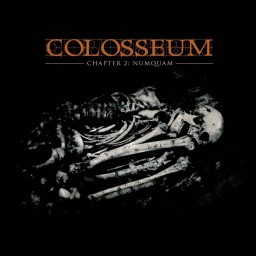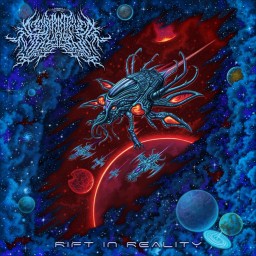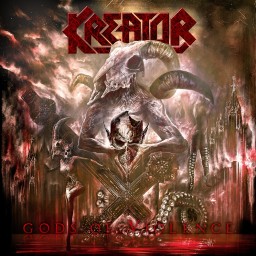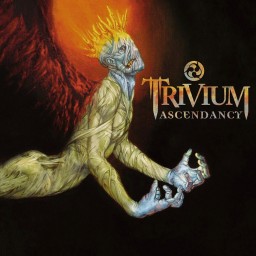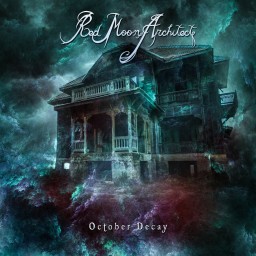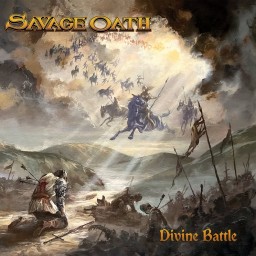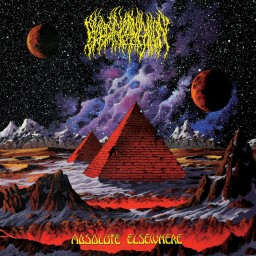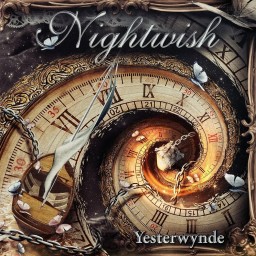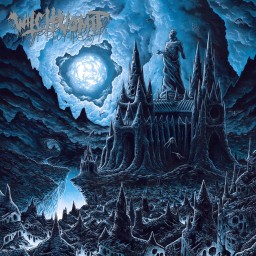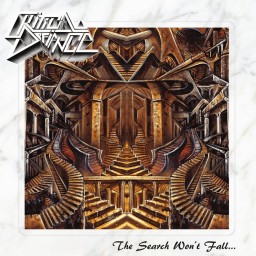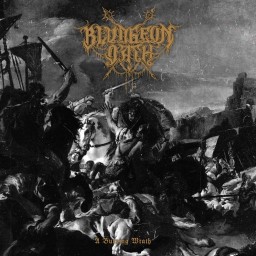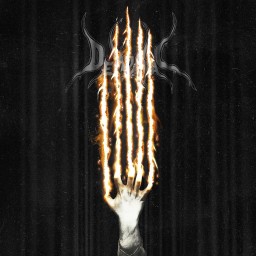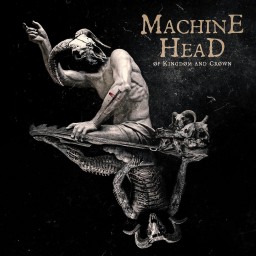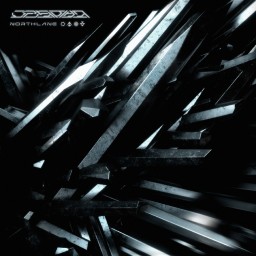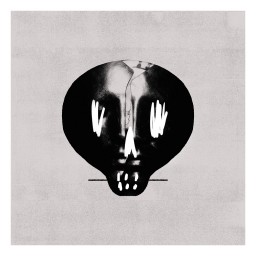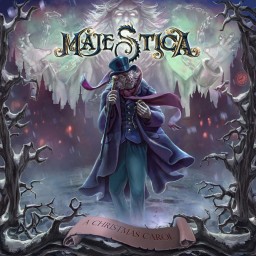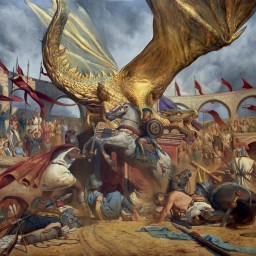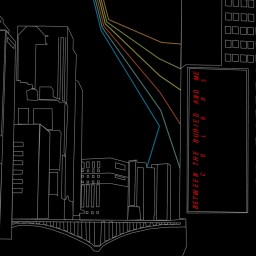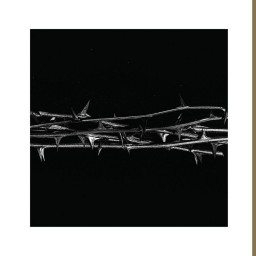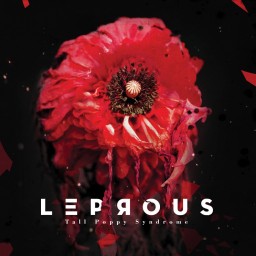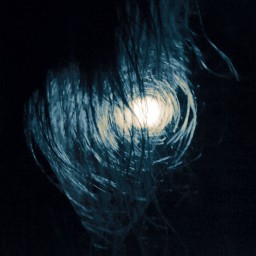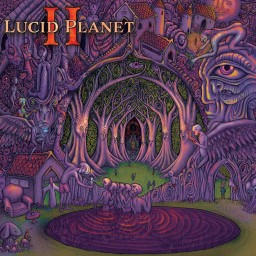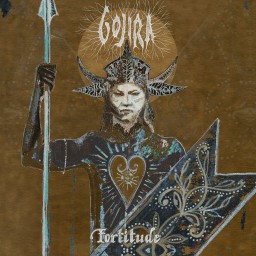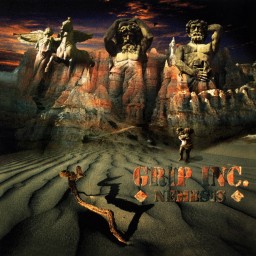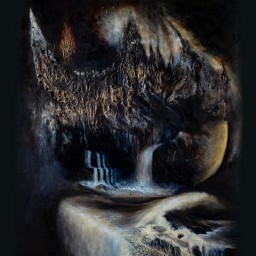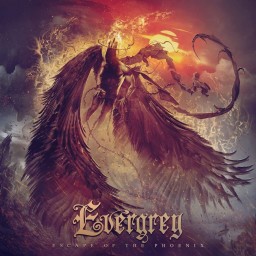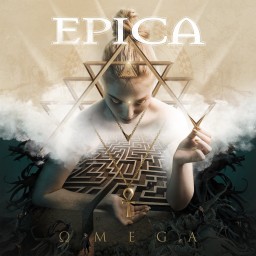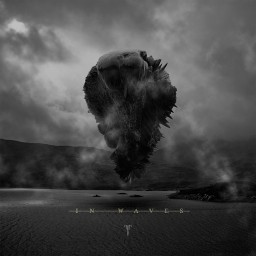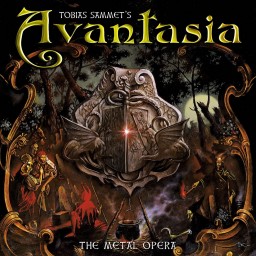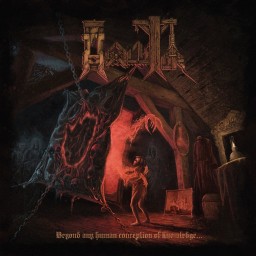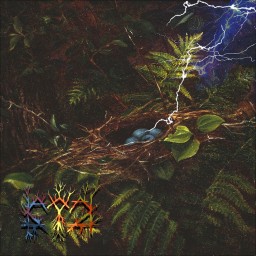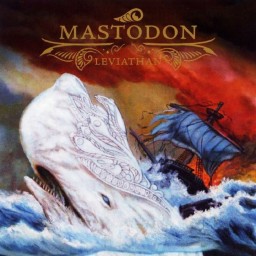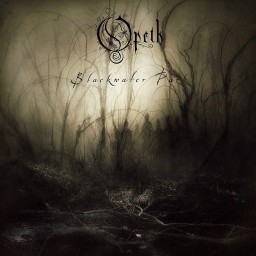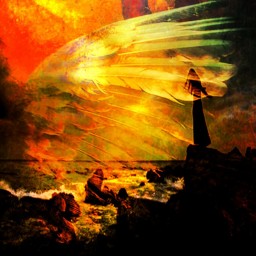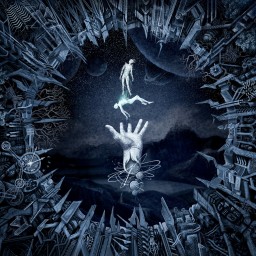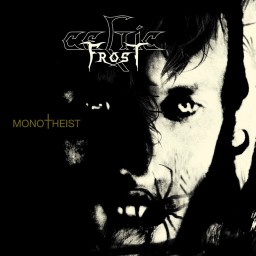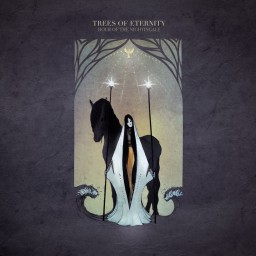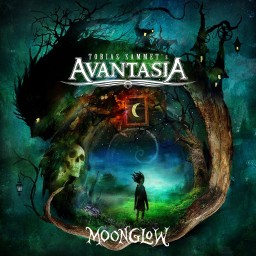Saxy S's Reviews
Now that my schedule has cleared up for the next couple of days, I can finally get to reviewing that new Protest the Hero album, but that will have to wait until tomorrow. Ever since joining Metal Academy, I have made it a goal of mine to listen to more metal in 2020 than I did in 2019, which should not be all that hard considering how much metal I actually ended up listening to during the year, minus my retrospective binge in January.
Another goal of mine was to listen to different subsections of the metal tag that I normally would not give the time of day. And this feels appropriate. Colosseum were a Finnish Funeral Doom metal band of the late 2000s most prominent remembered for their principal members being apart of the band Yearning. I chose this album because our good friend Sonny92's review was selected to the front page of RYM and I figured it was a good a time as any to cross something different off of my list (don't worry, the PTH album review will come tomorrow).
My distaste of this particular subgenre is the lack of melodic focus. On the opposite side of the spectrum, technical death metal has many of the same compositional tropes of funeral doom metal, in which melody is scorned at in favour of tempo, depending on the genre. With Colosseum, their is melody, quite a lot of it actually. And some of the individual songs on this album are quite impressive in scale. Since many of the tunes are relatively shorter to other funeral doom metal groups, Colosseum use the time they have been given effectively, giving these songs some much needed staying power.
The first half of this record is very well executed. "Towards the Infinite" and "The River" are two excellent standouts that exemplify the shorter songwriting's benefits to a tea. The string and synth embellishments throughout the record, but most prominently on the first half of "Prosperity" sound great. They have their own unique melodic flare at times have a very good overall sound, never feeling compromised by the thick guitars. As for the guitars, they are pretty good as well. I wish that they could have had some more melodic importance rather than serving as an extension of the rhythm section. As for the rhythm section, they sound decent enough; but then again, what did I expect from funeral doom metal. At least they sound good and carry these tunes forward.
Unfortunately the second half of this record drags on for far too long. I've already spoken about the excellent first half of "Prosperity" and that carries over into "Narcosis" as well, but the end of these songs just sort of...fizzle out and they spend their time simmering in whatever resido they can find. And the "Outro" sounds like a pretentious sound collage. It sounds nice from a production standpoint, but really leaves the album ending on a not so good foot.
If there is anything I can gather from this record, it is that Colosseum had potential. Their shorter song structures and focus on melody were big stepping stones that could actually make this music sound memorable. Unfortunately that never happened, and one of the members of this group would give in and commit suicide in 2010. If there were more artists creating funeral doom like this, I would be more intrigued in the genre. But for now, I'll take what I can get and this album is pretty solid.
Genres: Doom Metal
Format: Album
Year: 2009
When I heard that Labyrinthus Stellarum had a new album in 2025, and in such short order after Vortex of the Worlds, I wasn't expecting the album to be this drastic of a departure. It still has what I would consider the essence of the Ukrainian atmospheric black metal project, but instead of playing into the expected tropes of bands like White Ward and Deafheaven, Labyrinthus Stellarum borrow heavily from Blood Incantation of all groups! Specifically, the minimalist electronics of the album Timewave Zero. Make no mistake, Rift in Reality is an EBM album, and that's not the abbreviation you think it is.
Rift in Reality is, by all accounts, a pop album that just so happens to use black metal foundations. And I could not help being a little bit excited with "Voyagers", "Take Us Home" and "Cosmic Plague". And because the tracks are so short in execution, it becomes really easy to digest a project like this; it feels like you're getting hit by a truck relentlessly, but before you know it, it's over.
I would say that's a good thing most of the time, but Labyrinthus Stellarum litter Rift in Reality with some truly gross mixing. This record has zero grit and no desire to grow or show any dynamic swell. The guitar playing on this record is so neutered by compression that it might not even be here at all. The idea that this album could be considered metal at all should be troubling. The bass might as well not even exist with the exception of the few synth breaks because most of this albums highlighted parts are the percussion and vocals. The vocals are pleasant enough, but the percussion, like with their previous album, has this faded reverb effect throughout the album, which contributed greatly to the spacey and existential themes presented, but without anything to ground it in place, it loses some of that grandeur.
Rift in Reality is an album that might be considered controversial, especially by the black metal purists. But I wanted to like Rift in Reality within its first few moments and its attempts to go more pop. But terrible production choices make the rift between artful black metal and mainstream electronic metal more defined than ever before.
Best Songs: Ravenous Planet, Lost in the Void, Cosmic Plague
Genres: Black Metal
Format: Album
Year: 2025
When people ask me when I lost interest in the genre of thrash metal, I point them firmly in the direction of the years 2014-2016. During that time, all of the big four thrash bands released records. None of them were very good, yet everywhere I went, I heard cries of "thrash resurgence". I could not, in good faith, take the genre seriously anymore when their golden geese were releasing uninspired records and the only one that was any good (Anthrax's For All Kings) was underrated. This was in addition to many other B tier 1980s thrash bands like Exodus, Testament and Death Angel making a resurgence.
2017 was the end of my metal purge after post-secondary and I wanted something of sustenance beyond the tech-thrash coming out of Vektor and Revocation. So out comes Teutonic thrashers Kreator early in the year with Gods of Violence. I hadn't heard Kreator in quite some time but even I knew that this melo death inspired hybrid was not how Kreator sounded during their formative years. And yet for some reason, I really enjoy Gods of Violence. This is very likely the case that Teutonic thrash takes its influence from power metal; bands like Blind Guardian and Helloween have their influence felt in a lot of the lead guitars on "Gods of Violence" and "Lion with Eagle Wings". The albums main riffing is has some of that old school Slayer sound, while the modern production gives it some girth, and does have moments that remind me of modern Arch Enemy. Together, it might seem like Gods of Violence is a bit of a mess, but unlike the recent BABYMETAL album, these pieces are not kept isolated to single tracks on the album. Kreator have done an adequate job of revitalizing their sound to the modern age. Granted, I think Nuclear Blast might have something to do with that.
Gods of Violence was an album that took me a while to appreciate, given the time when I received it. It's a powerful record with lots of progressive effects used by Kreator to assist in relevancy. The main hooks are kind of hit-and-miss, but the hits do hit hard, songwriting is not bog standard and not a Sami guitar wank fest for almost an hour. When I'm not listening to progressive/technical thrash in my spare time, Gods of Violence is the type of thrash metal I use to relax.
Best Songs: World War Now, Gods of Violence, Lion with Eagle Wings, Fallen Brother
Genres: Thrash Metal
Format: Album
Year: 2017
Being the contrarian that I am, I must admit that Ascendancy was never my favourite Trivium record of the 2000s. It has always been a top 5 release, but could never overtake the likes of The Crusade and Shogun. Those records always had slightly more edge than their most successful and breakout album from 2005. That is not meant to serve as an insult to Ascendancy because while the album does sound patchy at points and also takes forever to end, this is the kind of melodic metalcore that does more than your standard hardcore album of the era.
When I think of this time frame of melodic metalcore, names like Killswitch Engage, Bullet for my Valentine and Parkway Drive inevitably come up. Trivium fall into the category with bands like Shadows Fall; following the trends of mainstream success, but with a nostalgic flare. My major criticism of this new wave of hardcore music is that songs are not constructed well, as they alternate back and forth between a quasi heavy metal section and a slow, brooding chugging breakdown. It transforms the album from Iron Maiden worship into an almost fully realized modernization. Trivium will exploit that detail here on Ascendancy almost to the point of being insufferable. Songs like "Pull Harder on the String of Your Martyr" and "Ascendancy" have some excellent grooves for about two-thirds of their length. Then during the bridge, the tempo and style drastically change so that the guitar players can wail for a while, before concluding with a return to the original form. Ironically, these deviations don't bother me as much as they would if they were on a modern metalcore record. "A Gunshot to the Head of Trepidation" starts off nostalgia farming with two riffs back-to-back that are just "One" and "Fear of the Dark" before becoming something else entirely about halfway through. The initial whiplash is perplexing, but Trivium allows that groove to simmer and burn instead of hanging it out to dry when the guitar solos conclude.
I must say that this riffing is fantastic. During a time when melodic metalcore was at a peak in the collective mainstream, there were few acts that could devise riffs like Trivium. Not only could they crank up the intensity on a whim, but they also knew that slowing down giving a reprieve would allow those solos to bit even more impactful. In a genre where tempo has gotten progressively slower over time, Ascendancy is a nostalgic trip back to the genre's thrash roots. Bands like Killswitch Engage and All That Remains could write better hooks, but Trivium are no slouch in this department either. I mean, one listen to "Dying in Your Arms" affirms that. And the album doesn't overindulge in its production. All of the records key aspects are pristine and precise; you won't find any symphonic or synthetic elements to bog down the mixing and overwhelm the listener during its thrashier segments.
This is just a really good album. Ascendancy represents a side of melocore during the mid 2000s that wanted to crossover, instead of being relegated to the kiddie pool. Many metalcore bands of the time were completely fine with playing Warped Tour, while Trivium were playing on MTV2 with Chimaira, Arch Enemy, In Flames and Lamb of God. Trivium got their recognition and ballooned into more progressive sounds later on Shogun and beyond. As its name suggests, Trivium really ascended to the top of the metal world around this time, and for good reason.
Best Songs: A Gunshot to the Head of Trepidation, Drowned and Torn Asunder, The Deceived, Pull Harder on the Strings of Your Martyr
Genres: Metalcore
Format: Album
Year: 2005
I have never been the biggest consumer of funeral doom metal. In the few ventures into this troubling subgenre, I’ve discovered that “creating good music” becomes a secondary feature and rather focuses on oppressive atmosphere. Sometimes that atmosphere can be enough to make serviceable, if not great, records. But often, they border on the line of stale drone that carries on far too long for their own sake.
I have made an attempt this year to become more cultured in subgenres (clans) of metal I normally would ignore or approach in bad faith. One such clan is The Fallen. And even though the music I’ve heard may be unremarkable (Deathwhite, Frayle, Decembre Noir and Hanging Garden), it still left me wanting more. I grow tired of the same death-doom/gothic sound and am desperate for a band to make me feel hopeless and abandoned like classic Ahab releases. (while still being pleasant to listen to of course!)
Well allow me to introduce Red Moon Architect. This band has been active for quite a while but never getting much in the way of recognition. Hailing from Finland, the instrumental backdrop of October Decay is heavily reminiscent of Swallow the Sun; heck, the album cover had me immediately thinking of The Morning Never Came. That presumption came crashing down in record time as the first isolating guitar riff began “Frozen Tomb” and the introduction of harsh death growls that are so distorted it starts to sound less like words and syllables and just becomes cries of agony. Now, if the whole album used these vocals, it’d probably be a hard sell, but complimenting it with wonderful female cleans was a breath of fresh air.
What October Decay does well is in the variety. The album starts off very melodic with lots of female vocals, occasional male harsh interjections, and (relatively speaking) busier guitar leads. That seems to change after “Decay of Emotions” and the run of “In Silence” until the album concludes with “First of October” is much heavier in the male vocals, guitar solos become sparser and use space to painstaking effect, and a heavier emphasis on string orchestration. Like an album such as The Call of the Wretched Sea, the change of pace, structure and instrumentation leave October Decay feeling like a sinking ship as the isolation of the guitar notes and percussion hits compresses you further and further towards the bottom.
Now I must admit that that Funeral Doom is not my thing, if that isn’t obvious by now. October Decay does not sound like an Esoteric or Bell Witch album. This is much closer to bands like Saturnus or Shape of Despair; still very much in the Death Doom category, but slower tempos, longer songs and dreary atmosphere bring it closer to the grave. Sinking to the bottom of the ocean have never felt so beautiful.
Best Songs: Frozen Tomb, Decay of Emotions, In Silence, First of October
Genres: Doom Metal
Format: Album
Year: 2025
In a futile attempt to clean up my metal listening in 2024, December (and likely into January) is the month I will be bolstering the more extreme clans here at Metal Academy that I frequent the least (i.e. Fallen, Horde and North), so there are going to be a lot of short little blurbs about a handful of records I heard in 2024. Hopefully, I'll be able to do something a little bit more timely come 2025.
From Nashville, Saidan are making black metal that has ties classic heavy metal sounds with the catchy guitar riffs, complimented by visceral vocals, pummeling blast beats and a relentless energy. Visual Kill is a grandiose album, but gives the listener some breathing room with some post-rock interludes on "Switchblade Paradise" that sound amazing, The key is the tunefulness and I haven't heard a black metal album this tuneful since...probably Sojourner's Premonitions in 2020. Production wise, it is black metal so the treble in the guitars, shrieking vocals and the bell chime of the ride cymbal sound great, but a underwhelming low end means that the overall power feels restrained. Overall if you're looking for an album that is melodically epic as well as musically intense, Saidan might have what you're looking for.
Best Songs: Desecration of a Lustful Illusion, Switchblade Paradise, Veins of The Wicked, Visual Kill
Genres: Black Metal
Format: Album
Year: 2024
It took a while for us to get here, but we finally have the debut full length record from US Power Metal's Savage Oath.
Now I might have said sometime ago that the American strain of Power Metal does not provide the same kind of positive reaction as the European counterpart. Something about it being super derivative and not doing much in the way of standing out from its influences. Power metal in the United States became much better when it dropped the cheesy pretense and became speed/thrash metal. But Savage Oath are trying to be a fading spark in a genre that is now almost exclusively carried by legacy acts.
In a way, Divine Battles reminds me of the newest releases by Cirith Ungol. The mixing is very underappreciated with how it sounds modern while also feeling deeply nostalgic. Guitars are not the focal point of this mix and that allows for the tasteful bass lines to give the album some dynamic weight. The percussion is pretty solid, if a little overbearing. But that only seems to be the case early on in the album on "Knight of the Night" and "Wings of Vengeance."
With such a solid foundation, it really pushes the vocals to the front and they sound excellent. Brendan Radigan has a varied vocal timbre and fits the landscape of this project quite well. There is quite a bit of influence from the power metal great vocalists, but also provides his own style and personality to the performance. That said, I feel like the variety in the vocals is a double edged sword; for example, while "Wings of Vengeance" has a wild timbre and can even be reminiscent of classic Rob Halford, songs like "Madness of the Crowd" have passages that sound deeply out of tune. It just sounds bad and gives me the feeling of sky high aspirations by the group that were just not met.
But beyond that, I don't see much else in the way of obvious criticisms. The album can run a little bit too long at times, but that feels like an issue for a handful of songs instead of a critique of the entire album. If you like power metal in the 21st century, but would like to hear something that isn't directly related to the past (i.e. Blind Guardian, Helloween, Metal Church), then Savage Oath might just be your next favourite band. Just hoping that the next album does something new and different.
Best Songs: Wings of Vengeance, Blood for the King, Savage Oath
Genres: Heavy Metal
Format: Album
Year: 2024
It should come as no surprise, but technical death metal is not my strong suit. There are very few acts in this genre of music that resonate with me. Far too often I find that these bands are too show-y for their own good, and it usually results in albums feeling less like musical endeavors and more like show off sessions. Bands like Ulcerate have recently shown me how this genre can be executed well, while Blood Incantation have gotten close.
Blood Incantation’s brand of technical death metal always had a classic flare to it, but with compositions that were firmly in the modern era. I was most intrigued by the bands 2022 EP Timewave Zero as a minimalist synthwave album. It showed real promise and opened a well of possibilities where they could take their next project. And that project turned into Absolute Elsewhere, which is a space opera not that dissimilar to Pestilence’s Spheres.
And Blood Incantation nailed it here. The album is basically in two acts broken up into six movements. The first act, “The Stargate” gives the impression of an amalgamation of the band’s death metal roots, and their synthwave escapade. There are massive dynamic shifts here they sound great. I never found the heavier death metal sections to become too overwhelming in the mixing or intensity; Arthur Rizk did an excellent job in this regard.
The second act, “The Message” is much more inline with Blood Incantations death metal sound. However, those expecting the more technical sounds of Hidden History of the Human Race might be disappointed. The technical proficiency has been set aside in favour of more diverse song structures; uncommon time signatures, wild tempo/style changes, and more motivic development. And the result is a passionate story that feels fully realized through modulation and growth. If you were to analyze this album as two songs, both parts are evenly deserving of their extended runtimes.
The main issue that I have with Absolute Elsewhere is the abandonment of technical death roots. Sure, they are here, but they feel like afterthoughts to the synthesized additions. The problem with “The Stargate” is that the synthwave passages feel far too elongated, especially during the second “tablet.” I think this album could have been even better if those synth parts had been more interwoven into the death metal foundation, instead of serving more as an interlude.
But I feel like I can overlook this when the rest of the project is so well constructed. I can imagine that some of the more hardcore tech-death fans would find Absolute Elsewhere a bit of a letdown with this style change, but the prog-death crowd should absolutely love this. Take your classic space operas and add this to the lexicon.
Best Songs: The Stargate [Tablet's I & III], The Message [Tablet's I & III]
Genres: Death Metal Progressive Metal
Format: Album
Year: 2024
When you think of Nightwish, what's the first thing that comes to mind?
This is a genuine question for those who are reading this and are familiar with the Finnish, Symphonic metal giants. This is a band that, through the 2000s, produced a number of high quality symphonic metal records that were packed to the brim with excellent production, fun and catchy hooks, and well thought out, well constructed album concepts. However, in recent years it appears like most of the lead decision making has been placed in the lap of Tuomas Holopainen since the departure of Tarja in 2006, not to mention the other band members all being replaced, with only Emppu as the other original member left.
When Floor Jensen took over the lead vocal role in 2015 on Endless Forms Most Beautiful, the decline in quality was noticeable, but not unbearable. But with Yesterwynde, we can see that Tuomas has finally reached writers block. With most of the original pieces absent, all that's left is what Tuomas thinks Nightwish sounded like on Wishmaster. But without other voices to bounce off of, the rest of the band feels like they are just along for the ride. As such, Yesterwynde sounds like the soundtrack to a Marvel movie, without the Marvel movie. Any motivic development that was present on previous albums has been neutered in favour of some of the worst progressive metal tendencies that I can recall; unconnected style flips, unnecessary tempo changes, bloated runtimes that include features that add nothing and instrumental wankage for its own sake. The core of Nightwish ceases to exist.
If the songs sounded decent I could have made some excuses, but even the production has gotten more lousy. And I get it, symphonic metal is hard to produce properly; my biggest criticism of Lorna Shore's Pain Remains was how it felt like the band was playing every single instrument at the same time all of the time. Without a clear feature everything blends together. And that is especially so on Yesterwynde. Unlike Lorna Shore, Floor Jansen's vocals are clean and operatic, and that makes the mesh of sound even worse. Symphonic instrumentation is overwhelming when paired with the power metal instrumentals of guitar, percussion and keyboards. And the vocals are compressed so far into the back of the mix, whatever kind of thematic arc Nightwish might have presented on this album is muted.
The album does take a bit of a symphonic turn around "Spider Silk" and the albums production becomes a little bit more bearable, but by that point the damage has already been done, and the heavier soundscapes is what I come to hear from Nightwish in the first place. It's too bad to say, but even for legacy act territory, Yesterwynde is not a good album. It almost has the exact same issue that I had with Within Temptation's 2019 album, Resist. I like symphonic metal, I really do, but too many modern bands try to make an album sound epic by stacking layer upon layer without actually stopping to ask if its still sounds good or has just become an audible mess.
Best Songs: Perfume Of The Timeless, Spider Silk
Genres: Symphonic Metal
Format: Album
Year: 2024
Now, I have never been one to judge an album by its cover, but one look at the name "Witch Vomit" and I was less than surprised when I heard Funeral Sanctum. It almost sounds like a fake name; perhaps even A.I. generated to sound brutal, but when spoken aloud just sounds fucking stupid.
Apologies for the tangent, but I just don't think that the band name should be ignored in this case. Especially when you consider the content of what's found inside Funeral Sanctum as a fairly straightforward approach to old school death metal. I enjoyed the instrumental production since it expands the individual songs and their diverse textures and flows. About half of this record has solid hooks and riffs and decent song composition, but another half of the album just feels like inconsequential riff fests. The vocals are also a fairly mute point since they return to Cookie Monster delivery, leaving the content severely lacking. The percussion is solid most of the time, but the way in which the kick drum is mixed leaves it sounding like the album is constantly slowing down. And the record holds its best moments during the first half of the recording and I start to notice sizeable dropoffs in quality in the back half, which are not helped at all by the two interlude tracks "Endarkened Spirits" and "Abject Silence (Interlude)" one after the other. And just to add icing to the cake, Funeral Sanctum is produced through 20 Buck Spin records.
I do not really resonate with old school death metal as much as other MA contributors do, but I can appreciate Funeral Sanctum for a decent, if not patchy mix, decent songwriting and a punchy runtime, making it so the relentless death metal does not become overwhelming. But as an enjoyer of the melodic side of the genre, Funeral Sanctum is missing many of the key aspects that make a death metal album great. It just isn't for me.
Best Songs: Serpentine Shadows, Black Wings of Desolation
Genres: Death Metal
Format: Album
Year: 2024
Critical Defiance were a band back in 2022 that should have no shot at being as good as they turned out to be. I was starting to dig myself out of the pessimistic hole that I self-inflicted when it came to modern thrash metal, only for fellow Metal Academy alumni Ben and Sonny introduced me to the world of Chilean thrash. Critical Defiance have been the darlings of this geographical style ever since and knew before being selected to April's featured release for the Pit that I was going to have to give it some attention.
Now, I rarely keep up with the revolving door of band members anymore because heavy metal is known for having lineups that are as flimsy as the relationship between Israel and Palestine. But upon completing a first listening to The Search Won't Fall, I was practically forced to check out what lineup changes had been made since No Life Forms, since this record is drastically different from their previous output. This record is significantly more technical; more long songs, experimentation in styles with "All the Powers" tinkering towards grindcore, "Margarita" being the slow, calming interlude carried by a soaring melodic guitar solo, and "Bulldog" as another guitar solo instrumental, but closer to the bands original thrash sound before shedding your face off with the almost ten (10) minute closer "Critical Defiance". For me though, the biggest surprise was the drastic inclusion of black metal influence on "Long Distance (The What's to Come)" and occasionally appears throughout the rest of the album. Let's just say that I was less than surprised when I read that guitarist Nicolás Young and drummer Rodrigo Poblete were ex-members of Chilean tech-thrash outlet Demoniac.
And I'm not against experimentation in thrash metal. The opener and "Long Distance (The What's to Come)" are both solid experimental, tech-thrash tunes, but why does Critical Defiance have to go down that route? There are more than enough tech-thrash bands tinkering in the world of black metal (even within the Chilean thrash scene) that Critical Defiance could have won easy brownie points by just doing what they've always done; straightforward, no fat, meat and potatoes thrash metal. Instead, the compositional choices here make it sound like Critical Defiance want to be further embraced by the critic spaces instead of making fun, headbanging thrash metal.
Which makes it even harder when "44 Minds" comes on and reverts back to the quick and efficient thrash style of No Life Forms. And it stays like this until the closing track on the album. It's almost like Critical Defiance really wanted The Search Won't Fall to be a progressive/technical thrash masterpiece similar to Demoniac's most recent album, then remembered that they are in fact, not Demoniac, and had to re-direct the ship so that the remainder of the album had Critical Defiance's most integral compositional elements.
And it isn't like the extreme metal influence hasn't always been there in the sound. The production of The Search Won't Fall is muddy, typically embraced by a wall of reverb in the guitar riffage and Felipe Alvarado's harsh screams. They give the soundscape a sense of rawness that most American thrash/groove bands would not dare employ, even as they attempt to replicate Slayer's Reign in Blood for the forty-eight thousandth time. Songs like "44 Minds" and "Absolüt" have a roughness to them that is greatly appreciated. In fact, most of this album has a lack of pristine performance, which was a large part of thrash and punk music's appeal and took me down the path of appreciating Chilean thrash metal as much as I do.
As it stands, I really wanted to enjoy The Search Won't Fall by Critical Defiance. And if you take this album at face value, then you'll find a lot of things to enjoy here. However, Critical Defiance are losing some of what made Critical Defiance such a great project in the first place. They served as a break and dumb fun from the tech-trash/quasi-black metal sound that has become widespread in Chilean thrash metal. But now it seems like they are becoming one with the meta.
Best Songs: Long Distance (The What's to Come), The Search Won't Fall, 44 Minds, Bulldog, Absolüt
Genres: Thrash Metal
Format: Album
Year: 2024
Going back and looking at my 2023 here at Metal Academy so far, it shows that this will be the year that I finally, fully embraced my Gateway clanship. That comes with a metric ton of problems that I will attempt to resolve in the coming years, but the biggest one is that my exploration of the North clan and black metal has been limited. A subgenre that I once explored frequently has become surprisingly absent from my listening in favour of mainstream metalcore and progressive death metal.
But when I saw some Canadian black metal from Bludgeon Oath come across my way, I figured it was worth a shot to experiment and I'm so glad that I did. This is some clean and atmospheric black metal that plays with dynamics incredibly well. Interspersed in between some gorgeous soundscapes of open chord guitars and blast beats is a masterful vocal performance. The chemistry between the vocals and instrumentals is great and leaves me with a feeling of insecurity as to where the album is going to go next, which is largely the point here. I really enjoyed the buildup of songs like "Crimson Storm of Swords" and "The Timeless Vaults of Eternity" and Bludgeon Oath compliment this with a great extended opener, "A Burning Wrath".
For once, I feel like A Burning Wrath is an album that could benefit from maybe one more song. As it is, thirty-two (32) minutes does not seem like a lot and Bludgeon Oath have already proven that they can make long songs that don't feel long. This was a pleasant surprise from a growing black metal scene in Quebec and I can't wait to hear what this group does in the future.
Best Songs: A Burning Wrath, Crimson Storm of Swords, Behold the Overwhelming Power
Genres: Black Metal
Format: Album
Year: 2023
Few things excite me in 2023 like seeing a new Chilean thrash metal release! If that last statement left you utterly confused considering who said it, congratulations! I felt the exact same way, but that's the way the cookie crumbles. Whether it be bands like Parkcrest, or Critical Defiance who snuck their way on to my short list of best records of 2022 with No Life Forms, thrash has seen a resurgence in recent years and now its time for Demoniac to show off what they've got.
For starters, Nube Negra is not a straightforward thrash metal album. I have said on a handful of occasions that thrash metal with progressive tendencies is a difficult genre to pin down. I cannot deny the quality of the music, but something about it just feels off and most of that comes through in the songwriting; usually something far too dense and overproduced for something relatively simple. Demoniac do not have that problem with their progressive leanings here as the album does not have a lot of time to meander. It is a longer album sure, considerably longer than No Life Forms, but even the drawn out passages feel earned and complimentary to the more traditional thrash element. The obvious example of this is the penultimate track "Veneno", which transforms into a quasi-doom outro that may feel out of place on the surface, but Demoniac's connectors are poignant and transform it from a two part mess into one of the albums highlights.
The mixing of the record is quite good as well. As a whole, Nube Negra has a distinctive black metal timbre the way its guitar melodies are performed and mixed, while the vocals are high screeching, typically with a lot of syllables and vocal diversity. I will admit to being a little bit alarmed the first time I heard a guitar solo, before quickly reminding myself that this album is primarily thrash. As for the solos themselves, they aren't super impressive, but the way in which they are presented is very well done; the lead guitar is pronounced and manages to outline whatever chord progression Demoniac are using, rather than relying on pentatonic scales.
The album ends on an impressive run from "Granada" to "Et Final" but getting to that point is a little tricky. Whether it be the short "Marchageddon" or the instrumental interlude "Synthèse d'accords", they leave a bit to be desired, but "Granada" is quickly becoming a favourite of mine and the final two tracks are no slouches either. "La Caida" is a decent piece of thrash metal, but then it decides to end with an inconclusive fade out and kind of sells all of the built up momentum short. It's the only fade out ending on the album too, so its inclusion becomes even more perplexing on repeated listens.
Demoniac are a very good modern thrash metal band and I'm glad I found the time to give Nube Negra a listen. Perhaps the album would have fared a little bit better for me if it decided to dig a little deeper into its progressive metal influences a bit more. An band that has clear ties to Vektor with a more concise runtime would be a fantastic listen and sounds like it could be a modern thrash classic. As for now though, Demoniac are a band who have the pieces to make something great, but need a little refining first.
Best Songs: Nube Negra, Granada, Veneno, La Caida
Genres: Thrash Metal
Format: Album
Year: 2023
2018 was a rough year for Machine Head. Catharsis was a really bad album that managed to unite people on both sides of political spectrum in just how shitty of an activist Rob Flynn is. Lyrics that sounded like they were written by a Tumblr user, but were instead written by a 50 year old man, all performed over an alternative/nu metal soundscape that was the farthest thing from pleasing to the metal ear, or conforming to the Machine Head sound. Now I stood up for that album four year ago, claiming that there were some serviceable songs that maintained the Machine Head identity, while still pushing the boundaries of what this band could sound like (i.e. "Heavy is the Crown" and "Kaleidoscope"), while other experiments just spectacularly failed.
And so, it should come as zero surprise that following a release cycle that almost ended this band, the new Machine Head album, ØF KINGDOM AND CRØWN is a return to form (somewhat) for the band. It's groove centric, melodies are limited but respectable, dueling guitar solos make a triumphant return, and the overall intensity matches that of The Blackening and Unto the Locust.
One thing that Machine Head maintained from those previous recording sessions were extended runtimes. This is not all too unfamiliar in Machine Head's discography, but this album can be a slog at times. The opening track "SLAUGHTER THE MARTYR" is ten and a half minutes, but could have easily been suppressed to seven and said the same amount. When the album is at its best, Machine Head is calling back to an older sound, while still allowing for some alternative metal ideas to slip in; primarily in the vocal leads. "MY HANDS ARE EMPTY" and "UNHALLØWED" both do this with slower grooves and more somber delivery.
Perhaps that's because the previous songs are both closer to deathcore of all things! Machine Head have been no stranger to breakdowns in their music, but here they feel out of place and extremely unnecessary. Whether it be the dissonant chuggs of "CHØKE ØN THE ASHES ØF YØUR HATE", which also return on the closer "ARRØWS IN WØRDS FRØM THE SKY", or the unnatural tempo shift on "BECØME THE FIRESTØRM". Then there are the lyrics, which thank god are infinitely improved from Catharsis. There is some genuine reflection here that has allowed Rob Flynn to choose his words carefully in order to make an impact and possibly change people. But then "KILL THY ENEMIES" comes on and I hear Flynn speak about white privilege, fascists and cultists and I just tune out. What's more infuriating is that the narrator honestly believes that they are the good guy here when they unironically speak: "I'm asking you to heed the call, kill thy enemies". Whose side are you on: those who say naughty words, or those who carry the blood of their enemies on their hands joyously?
To say this album is an improvement from Catharsis is like saying 2022 has been a better year than 2020. Machine Head would have had to included the sounds of killing puppies and a dramatic reading of Mein Kampf to make an album worse than Catharsis. But that does not mean ØF KINGDOM AND CRØWN is a great album. It sounds more like Machine Head and the experimentation is not alienating to fans, but a lack of fat trimming, less than their best melodies and grooves and questionable lyricism makes it more lukewarm than anything else. The emperor may have a fig leaf, but he is still naked.
Best Songs: MY HANDS ARE EMPTY, UNHALLØWED, NØ GØDS, NØ MASTERS, BLØØDSHØT
Genres: Groove Metal
Format: Album
Year: 2022
In a complete contrast to the new Enterprise Earth album, Obsidian by Northlane has attracted some controversy in the metalcore community while the critic community are quick to throw praise at it. This one is far more expected than the Enterprise Earth album since we have seen this song and dance time and time again; a metalcore band who drops more heaviness with each subsequent release and starts writing actual songs with form rather than breakdowns with interludes. It happened with Bring Me The Horizon, it happened with Architects, and now it's happening to Northlane.
Those people clearly didn't actually listen to the record. Barring the final four tracks on Obsidian, this record contains most of, if not all, of Northlane's tropes over the last five years. The breakdowns are still as punishing as ever while still being musically involved with the rest of the compositions, the djent elements are technical and robust, and the industrial elements don't sound like this album was recorded in a car manufacturer. And to say this record is lacking metal elements is disingenuous to say the least.
The only moment where this is applicable is "Nova", which might be the most interesting track on the album. It reminds me of a late era Linkin Park song and the atmosphere is quite refreshing following all the djent-y and industrial goodness. Where this record loses me is some the heavier tracks, mostly "Clarity" and "Xen", which sound less like Northlane exploring their desired sound path and rather as a ploy to get useful idiots on board. The way I see it, if Northlane want to drop the heavier portions of their metalcore roots, just do it. Those who would immediately drop you because you are not heavy enough aren't real fans. And there is actually a lot to like here, more so than the new Enterprise Earth album, but like with that record, this band should stick to their lane.
Best Songs: Clockwork, Abomination, Is This a Test?, Cypher, Inamorata
Genres: Alternative Metal Industrial Metal
Format: Album
Year: 2022
I didn't listen to this album last year, but did come across "Parasite" on a whim, and being very surprised by the drastic change in direction after being swallowed whole by the "Imagine Dragon" on their last album. This was heavier, less electronics, fast and lots of harsh vocals. When I listened to the album and saw "Parasite" as the opener, followed by snippets of BFMV's greatest hits, I saw the band hinting at changing their sound; either to the applause or disdain of their fans. I appreciated it because they could always hold a melody together and "Parasite" is a good opener.
The rest of the album? Well it has moments; the more thrash adjacent stuff like "Paralysed" near the top of that department. "Can't Escape The Waves" is a mid album "ballad" that harkens back to "All These Things I Hate (Revolve Around Me)" with a surprising style change during the intro. It does feel like a little bit too much going on, but the faint sustain triads in the lead guitar bring it all together. And "Shatter" for having a solid melodic chorus to go along with a Bring Me The Horizon meets Pantera instrumental that was very well done.
This albums has a lot of harsh vocals on it...perhaps a little too much. There were quite a few points on this record, most notably in "Knives" and "Bastards" where the constant swapping between Matt's cleans singing and harsh screaming is kind of bad; like the band wanted to sound heavy so they threw in as many screamed vocals as possible, when in reality, BFMV were never this egregious with it. The heaviest moments on The Poison like "Hand of Blood" had harsh vocals, but they felt deserved and not shoehorned in. Beyond that "Bastards" sounds like a rejected Three Days Grace song, "My Reverie" is incredibly basic fundamentally, the thematic arc of this record is anti-authority, but could have used a couple more rough drafts as they feel interchangeable with anti-authority records by Muse. And production wise, it sounds a lot more open with its space than either Spiritbox or Trivium's last albums, but if you can hear the bass during some of the isolated moments, you're ears are far more equipped than mine. Why it does not feel as dense during the softer portions is beyond me.
In the end, this is a great improvement from 2018's Gravity. But Bullet For My Valentine's recent venture's after changing label's from Sony to UMG has had them kill their personality with Gravity, and now this feels like the apology tour. Unfortunately this apology feels half assed as it tries to lure you in with its chugging guitars and harsh vocals, while anyone who knows what BFMV once sounded knows that this is only for the clout.
Genres: Alternative Metal Metalcore
Format: Album
Year: 2021
In life, there are a few things that are for certain: death, taxes, and Christmas music. I swear to god, it seems like the benchmark as to when it is considered acceptable to start playing Christmas music gets earlier every single year. And every year my tolerance for Christmas music wears more thin. By the time we make it to the actual day, I'm so sick and tired of Christmas that I just want it to be over. Just for once, I would like to hear someone bring some substance to a genre of music that is incredibly shallow during the best of times.
Enter Majestica, a Swedish symphonic metal band doing the Avantasia gimmick of conceptual metal album with a distinctive holiday flare. And I know what you're thinking: isn't this just the Trans-Siberian Orchestra's gimmick? Well...no. Don't get me wrong: this is pure cheese, but like in a really good way. This isn't just a collection of classic Christmas carols with a hard rock/heavy metal edge. Majestica are ready to go jingle bells to the wall by giving these Christmas carols a facelift. You'll hear interpolations of "O Come All Ye Faithful", "Joy To The World", "God Rest Ye Merry Gentlemen" among others. Some of them are transposed into the minor key, most of them are given lyrical overhauls. At the very least, the tunes are given some personality beyond just artist flare.
I would say that this hodgepodge of Christmas theme's can feel overzealous at times, but then you have to take into consideration the concept of this album. In short, it is a retelling of the classic Charles Dickens tale, so I see no real reason as to why these themes cannot be interpolated. In fact, the later half of this album from "Ghost of Christmas to Come" and "A Christmas Has Come", plus the interlude "The Joy of Christmas" have their own melodic ideas; this is thematically smart since the Ghost of Christmas Future would know the songs that we, in the present, do not.
As for the way this album sounds, I can't really think of all that much to say. It's remarkably cheesy as mentioned before as the symphonic elements are blatant and at the forefront of the mix. The bass lines are fruitful, the guitar work is melodic, and the vocals are a little hit and miss, but more hits than misses. The mixing on this record is splendid! I really enjoy how important the instrumentals are to the telling of the tale as much as the lyrics are; it's a very nice touch that you seldom hear in modern pop music, and especially in metal.
Why I hesitate on calling this great is because of my review of DragonForce's Inhuman Rampage a few months ago. I described that record as the quintessential power metal album. With no funny business or progressive fat, it could be a fun experience for those who like straight up, unfiltered metal. Majestica are much the same for symphonic metal, but have the engineering to back it up. A Christmas record might not be the first thing I go to, but for a brief period of time, it does remind me of the most wonderful time of the year.
Genres: Power Metal Symphonic Metal
Format: Album
Year: 2020
I had to skip out on Trivium's 2020 album What The Dead Men Say because of a ever inflating schedule during the beginning of that year that was only exacerbated by the COVID-19 lockdown. By the time I finally found the time to give it a listen, I enjoyed what I heard, but felt like Trivium were going to have a difficult time maintaining their momentum following The Sin And The Sentence, which basically serves as a retrospective album for the band. What could they possibly do next?
Well apparently the answer to that question was throw it back to the earliest albums like Embers To Inferno and Ascendancy with a significantly heavier thrash influence. And my goodness is it not one pleasant listen! I've always liked Trivium and there brand of "progressive metalcore" that has been brewing since Shogun, and this record may see it at its closest to greatness so far!
And it all starts with production. Paulo's bass is finally given some much needed independence from the rhythm guitars and sounds more pronounced during the doubling passages. The chorus on "No Way Back Just Through", "Like A Sword Over Damocles" are fully engulfing and sound heavier than any previous Trivium album, and of course, the breakdowns on tracks like "The Shadow Of The Abbatoir" is monstrous, heavy and awesome.
The guitar work on In The Court Of The Dragon is about what you might expect from a Trivium album: very thrash oriented with an emphasis on guitar leads and solos. "Fall Into Your Hands" has a really cool primary riff and the solos are smooth in that they don't follow simple pentatonic/blues patterns. The title track is a great opener with a huge chorus and complimented by the accompanying guitar lead. The vocals are a little bit underwhelming; Matt Heafy has an awesome clean vocal timbre and while that certainly does get plenty of use on this album, it feels like more of the screaming is also done by Heafy, who in comparison to Corey Beaulieu, does not have as powerful of a singing voice. Speaking of powerful, these drums are insane by metalcore standards! Pretty much every song has at least one blast beat section to compliment the heavy, slower grooves of the breakdowns. And the drum fills are massive as well. Sometimes I wis h that Alex Bent would show a little bit more restraint with a little bit more frequency.
Where this album loses me the most is some of the more progressive songwriting choices. In The Court Of The Dragon has some explosive riffs, choruses and breakdowns, but songs like "The Phalanx" and "Fall Into Your Hands" have the fairly common problem of trying to fit in too many ideas into one single track and as a result, some of those moments very quickly become secondary to something else that is either less catchy or a technical wankery section that causes it to lose its momentum. On the other hand, while "Feast Of Fire" is the album's most crossover friendly song, it also feels quite formulaic as an alternative metal track and does not mesh well with anything else on this album.
Judging by that album cover, you would be forgiven if you thought that In The Court Of The Dragon was some kind of power metal album. And I will admit, this album might be one of Trivium's least metalcore album's to date with all of the blistering solos, blast beats, high concepts and melodic guitar leads. But it goes right in line with what I said during my In Waves album review months ago: "This band always seems to be pushing the buttons of what the members are capable of," and "Trivium sometimes sound more progressive than the actual progressive metal bands like Dream Theater." This is the most fun I've had with a Trivium album since In Waves and everything that I enjoyed about that record is on display here with some new twists along the way.
Genres: Metalcore
Format: Album
Year: 2021
I’m a little surprised I haven’t talked about Wolves In The Throne Room proper yet. Many of my black metal preferences (Agalloch, Saor, Blut Aus Nord, etc.) have similar fan bases with this band. They are a long running atmo-black band out of Washington and are mostly known for their 2007 record Two Hunters, which is mostly known for its focus on nature through the soaring riffage and melodies, to go along with some long song structures and forms.
The newest album, Primordial Arcana, has more tracks than previous WITTR albums, but compliments it by having typically shorter runtimes. Already I can tell that this album is an easier sell as shorter runtimes mean less opportunity for the band to fall into meandering interludes, and that is certainly the case here. Songs like “Mountain Magick” and “Through Eternal Fields” sound massive and do not feel like they are getting stuck behind a proverbial wall as they wait for the next section to commence.
And while Wolves In The Throne Room continue their run of adding more ambience and perhaps dungeon synth into their work, the sections that can fully described as “black metal” are trimmed down further than ever before. I feel like “Primal Chasm (Gift of Fire)” does most of this records “heavy” lifting, but the rest of it feels ethereal in a way and the blast beats that conclude “Through Eternal Fields” are more complimentary to the main guitar riffs that bring that song to its conclusion.
Beyond that, I don’t think that Primordial Arcana is a bad album; it has everything that you could ever want from a shorter, more concise WITTR album. The problem? I have heard this same formula echoed by many other atmo-black bands in recent years with shorter runtimes, while still explosive black metal passages. Whether that be the old guard with Blut Aus Nord, or newer bands like The Great Old Ones. This sound should not be unfamiliar with those who are well diverse in the atmospheric black metal scene in 2021.
Genres: Black Metal
Format: Album
Year: 2021
It's time to have the BTBAM conversation.
My exploration of technical death metal during the mid 2000s led me through a lot of shit. Most of it is music that I would only listen to in the abyss of the mosh pit. And even then, I was also listening to plenty of melodic metalcore during this time as well, which I would argue at least has the benefit of being recognizable as a fully developed song with melodies and grooves so that I could recognize it outside of those pits.
Which leads us to BTBAM specifically. My introduction to this band was through a longtime friend of mine who was far more engulfed in the metalcore scene of the time. And knowing full well about my preference towards the melodic side of the genre, as well as my prog snob status, I was told to at least give these guys a chance, even though it might take some time to adjust. And so, they let me borrow their copy of 2007 Colors and...it took me a long time to part with that record and buy a copy of my own!
I think that it is important to understand that prior to Colors, Between The Buried And Me were a technical death metal band first. The debut is a gritty album, and The Silent Circus was quite similar, even despite some attempts at melodic songwriting. And while Alaska had more positive steps in the right direction, it felt a lot more disjointed than the bands follow-up Colors; a marvel in conceptual progressive music. The technical moments are still on dramatic display, but a lot of these elements are blended together with melodic passages on "Informal Gluttony" and "White Walls". "Sun of Nothing" may be one of the best things that this band has ever recorded in the way it juggles these sound palettes together.
And the strange part about it all is that I'm just as surprised to this day that it works as well as it does at all! The compositions are all quite disjointed as they alternate back and forth between progressive and technical, but very rarely repeating a musical motif. I think that "Prequel To The Sequel" is a superb example of how, even though motifs may not have direct correlations to one another, the interconnectivity through similar tempos as they modulate through time signatures and key changes is outstanding. Songs like "Informal Gluttony", the intro and outro of "Prequel To The Sequel", and how the bridge of "White Walls" directly references the previous track "Viridian" is refreshing for a concept album.
As for the albums sound, I still have yet to hear a technical death metal album that has the same level of precision and Colors. First and foremost, Dan Briggs sounds phenomenal on this record. This album does have plenty of chugging guitar riffage, but it never compromises this albums low end. As for those guitars, I love how this band flawlessly balances the lead and rhythm parts at all times; this is more so important for Tommy Rogers vocals, synths and Blake Richadson's drum work. Starting with vocals, Tommy's vocals have never sounded better than they do on this album. Too many times on recent BTBAM albums, the harsh vocals feel compromised and almost feel like a cop out in order to maintain favour with old fans of the band. I harken it to what Opeth did with Heritage in 2011, but never fully letting go. With this album however, the prominent harsh vocals and occasional sung vocals (which do feel more like chants) on "Ant Of The Sky" and "Informal Gluttony" serve Rogers well instead of trying to be a Geoff Tate. As for Richardson, the drums are very intense, but don't become overbearing as he balances the metalcore/tech death passages remarkably well as both are delivered with incredible precision.
Nothing Between The Buried And Me have done before or since has been able to live up to the monumental achievement that is Colors. The blending of melodic metal/mathcore with technical death metal is spot on. Furthermore, the balancing act of technical death and progressive metal may truly be lightning in a bottle. I've reviewed quite a few albums in recent months that have attempted this balancing act, but none have been able to find anything close to the balance that is found here. If you're like me, and you ever find yourself struggling trying to appreciate progressive metal that is heavy on the technical side, Colors is the album that shines the brightest. I only hope that this album is as vibrant for you as it was for me.
Genres: Metalcore Progressive Metal
Format: Album
Year: 2007
Ever since I discovered La Dispute almost ten years ago, I have become far more willing to accept the artsy brand of poetry in music as it can be done remarkably well if given the time and preparation. From post-hardcore, this sound could also be co-opted by post-metal, which brings us to Amenra, the Belgian output responsible for the Mass series of albums throughout the 2000-2010s.
The new record is removed from that series and has a unique flare to it, while still maintaining all of the tropes that are frequent in this pummeling brand of atmospheric sludge metal. Dynamic's are key and while each track on this album spans at least eight minutes a piece, they all manage to tell a cohesive story. The hauntingly somber intros to "Ogentroost" and "Voor Immer" are paired with huge guitar chords, emphatic low ends and a vocalist that sounds like they are just moments away from bursting into tears. The soft spoken word and occasional sung vocals (male/female) sound very calming by comparison. My favourite moment on the record occurs on "De Evenmens", where the bridge builds up in tempo ever so slowly that you probably wouldn't even notice it, but not before the outro hits and the tempo drastically drops back down to the way it was at the start. And I would be remised if I didn't mention the excellent placement of "De Dood In Bloei", flowing the first three tracks together.
Beyond that, it is just another atmo-sludge/post metal album; never really living up to the heights this genre has to offer from Cult of Luna or Rosetta. That said, it is still a very fascinating and close to great album. It sounds powerful and brooding, while also being very open in its time of weakness. The whiplash adds to its storytelling that is very disturbing. De doorn is a captivating album for the post-metal fan and should be heard by anyone who likes Cult of Luna.
Genres: Sludge Metal Post-Metal
Format: Album
Year: 2021
I've been familiar with Leprous for a long time now. I caught on to this band after their very successful 2013 album Coal and got to see this band meteoric rise to fame from the ground up with 2015's The Congregation. That being said, while I really did enjoy those albums, I only recently went back to listen to Leprous' older discography and, most notably, Tall Poppy Syndrome. Unfortunately for what was a relatively new progressive metal band at the time, Leprous never caught my attention in the same year veterans like BTBAM released The Great Misdirect, Amorphis' Skyforger, and Mastodon's bid for progressive album of the decade, Crack the Skye.
The first thing that I noticed was how much heavier this album is than the groups later efforts. The songwriting is much more sporadic and technical and it also features many more crunchy rhythm guitars. But it all sounds so smooth. While some of the transitions between different phrases can have a heavy whiplash factor, I am super impressed by how Leprous pulls these phrases/themes together and makes fully explored songs instead of a random grab bag of pieces thrown together. Each section is incorporated more than once in each song and in some cases, in polyphony. "He Will Kill Again" has an excellent build while still maintaining a fairly straightforward form, while songs like "Phantom Pain" and "Not Even A Name" sound humongous thanks to some killer bass grooves. And the closer "White" does not overstay its welcome despite an eleven-and-a-half minute performance.
But Leprous has always stood out for me because of the vocals from Einar Solberg. The natural charisma that is used as he alternates between stupendous melodic singing and the harsh screams is commendable. There are countless metal bands who wish they had a vocalist that could pull off both as wonderful as this! Speaking of those harsh vocals, this is something that has become far less prominent on subsequent records. So hearing them as frequently as they are on Tall Poppy Syndrome took a little bit of adjusting to get used to. But over multiple listens, I think I like them even more!
The two biggest faults this album has going for it are the length and some of the synth choices. The former is pretty obvious; songs like "Dare You" sound really good and have some fantastic hooks/grooves, but some of the middle sections feel like they meander and could have been cut, and the outro of "Not Even A Name" is played out as well. As for the synths, they sound incredibly late 2000s; most notably on the bridge of "Phantom Pain". I didn't like it when bands like TDWP and other adjacent Warped Tour metalcore bands used it and I'm not going to let it slide here!
Overall, I did enjoy going back to this older, heavier version of Leprous, it still maintains many of the integral songwriting techniques that are present on later records, but pulls them off with more gravitas, and the great production to back it up. I'm not sure it will ever eclipse Coal in my mind, but it does make quite the intriguing case.
Genres: Progressive Metal
Format: Album
Year: 2009
After Mestarin kynsi won pretty much all of the critics 2020 best metal albums award, it was only a matter of time before those of us who caught on to Oranssi Pazuzu late would have to take the deep dive into the bands 2016 album, Värähtelijä. This album was equally as well received, if not more so, by critics at the time and as an outside looking in, I can only imagine why Oranssi Pazuzu were given such a loose second opportunity.
That's not to say that I do not like Värähtelijä, I absolutely do! But I've heard many atmospheric and psychedelic black metal albums in the years since this album was released and can only see it as a stepping stone towards greater things for Oranssi Pazuzu, including Mestarin kynsi!
First and foremost, I see Värähtelijä as an experimental project by comparison to its later sequel being the more refined mending of ideas together. This album contains a similar number of tracks as its follow up, but the tunes feel less impressive. The obvious outlier here is "Vasemman käden hierarkia", which sounds more like an extended jam session rather than a collection of ideas formulated together into something spectacular. At the very least, Ornassi Pazuzu are smart enough to make each of the tracks distinguishable from one another; a problem that many psychedelic albums face. After "Lahja" and the title track leave lots of space for post-rock elements, "Hypnotisoitu viharukous" drastically ramps up the intensity and is further explored on "Havuluu". And ending the album on the relatively laid back "Valveavaruus" gives this record a truly unsettling conclusion to a mostly unsettling project.
And even though the production on this album is very muddy, it does play into its benefit slightly. Psychedelic rock does not need to be riff-centric when it is the wall of sound technique that has been imported from atmospheric black metal that creates the comfortable, yet unsettling environment. I found that the fewer synthetic sounds did not help matters in making this nearly as unsettling as Ornassi Pazuzu may have thought, but these advances were made on later albums, so once again, I feel like this was an experiment for the band to see what would stick and then develop that sound further on subsequent releases.
But in the end, I know why people enjoy this record so much and while it may not be my personal cup of tea, I certainly appreciate its quality. For me, I prefer my atmo-black metal with sweeping melodic phrases and epic hooks and tales of folklore. Bit for an unsettling taste of psychedelic rock meets atmospheric black metal, you can never go wrong with Oranssi Pazuzu, even though I feel Mestarin kynsi is the culmination of this sound.
Genres: Black Metal Post-Metal
Format: Album
Year: 2016
There comes a time in every prog snob's lifetime where they have to separate the technicality of the music from the actual quality. For far too long, I have found myself being overly favorable to progressive rock/metal albums for the sole purpose of "yep, this doesn't sound anything like what you hear on the radio!" despite the fact that in the lexicon of progressive music, an album may sound formulaic. With that being said, I can honestly say that I have never heard ANYTHING that sounds remotely close to Lucid Planet in my lifetime. The closest comparison that I can make is if you took the psychedelic's and post-metal of early 2000s Tool and combined it with some Orphaned Land and perhaps some of the modern electronic trends that have been plaguing a lot of alternative metal bands in recent years; most notably Bring Me The Horizon, Architects and Bullet For My Valentine. And even then that still does not even scratch the surface!
Lucid Planet II is an intoxicating album which sees the band mess around the spectrum of psychedelic music with a record that never feels like it is confined to the label of "Metal". How appropriate since Tool feels very much the same way. They use sitar, tabla, strings, digeridoo and various other horns throughout the mix. While certain interlude passages incorporate electronic percussion in addition to acoustic parts. The electric guitars are sparse and do not play a super important role as they would on say an early 2000s Opeth record. It all comes together into a nicely fit package that defies the laws of progressive metal, emphasis on the word "metal".
Because unlike many of Lucid Planet's contemporaries, this is a band that cares about their interludes, if you can even call them that. In comparison to songs like "Organic Hard Drive" and "Face the Sun", "Entrancement" "Offer" and "Digital Ritual" are significantly shorter and contain very little of the metal tones that exist on the albums longer tracks. And I'll be damned if they aren't some of the best interludes I've heard on any album in quite some time! "Entrancement" lives up to its title by starting very ambient and peaceful, but gradually building up intensity through dynamics, but also adding significant percussion and vocals to the mix and growing as a whole and never becoming stale. I also really dig "Digital Ritual": while the first half is very ritualistic, the flip of glitchy percussion and bombastic synths on the second half sounds incredible!
But outside of the interludes, the rest of the album is very solid as well. The opener "Anamnesis" splits the difference between Lateralus era Tool and Katatonia, which carries into "Organic Hard Drive". While "Face the Sun" and "Zenith" end the album on a trance induced high note that is quite stunning in its follow through of all of the ideas put forth up to this point, and flowing one into the next without feeling chopped up and poorly balanced together. Another thing that Lucid Planet are able to pull off incredibly well on this album is seamless transitions. Like with a lot of progressive/technical albums with so many uncommon time signatures, it can become very difficult to make moving between themes sound fluent. This album has plenty of moments that will make you wonder "how the hell did we get from point A to point B and I didn't even notice!" The one that I picked up on was the flawless transition from triplets to sixteenth notes on "On the Way".
Where I will knock a couple of points back from Lucid Planet II is that some of the longer songs do not feel as memorable as even some of Tool's longer songs. But where Lucid Planet makes up for that is in the incredible interludes and simple repetitive motifs that persist throughout songs and in some cases, throughout the entire album.
At the beginning, I mentioned how prog snobs need to get over the fact that their music sounds nothing like radio friendly rock/metal and that the technicality does not automatically make an album a classic. With that being said, Lucid Planet's sophomore album is one in which I feel its unique charm plays into its benefit. Nothing else sounds like this and I highly doubt that anything will ever sound like this. It borrows from all over the spectrum of psychedelia and creates a new entity that is just as intoxicating as the sum of its parts. If any of that descriptor interests you, then let Lucid Planet II take you on a journey unlike any other.
Genres: Progressive Metal
Format: Album
Year: 2020
To those who are familiar with my heavy metal journey over the last ten years may be surprised to know that I have a fondness for the French based progressive groove metal band, Gojira. They tend to write very simplistic melodies to their songs, but they never feel as if they have the same amount of importance to the existence of a song as much as the strong groove elements. In a way, Gojira could be viewed as the true gateway into djent, or more specifically, Meshuggah. And I do not make that comparison lightly.
Their album’s have improved over time, with L’Enfant Sauvage being my personal favourite, and now with Fortitude, we can hear the band further commercializing their progressive sound; such is necessary if you want to gain more clicks/streams/ticket sales. The melodies on this new record are solid enough, but still very much fall into a groove first mentality, meaning that songs like “Sphinx” and “Amazonia” are not as good overall as the sum of their parts.
Furthermore, Gojira’s biggest issue with all of their album’s has been the production. For as powerful as the grooves are on Fortitude, a lot of the main guitar and percussion can become overbearing during the melodic sections, drowning out some of the vocal leads. Granted these are not as common as you might think; the main vocals from Joe Duplantier feel secondary to the instrumentals on a compositional level, so much so that “The Chant” features the fewest vocals on the record...and I kind of like it better than anything else.
As a progressive metal album, Gojira have been going down this path for quite a while now, and only expedited by transferring over to Roadrunner Records with Magma in 2016. And it has further alienated fans who came up with From Mars to Sirius and The Way of all Flesh with each subsequent album. I don’t find Fortitude to be that much of a downgrade from Magma; in fact I would probably call it the better of the two albums. But I do not expect myself to give djent another try, despite Gojira’s best efforts to the contrary.
Genres: Groove Metal Progressive Metal
Format: Album
Year: 2021
Perhaps it is the benefactor of lowered expectations, but I had very little motivation to check out Grip Inc.'s sophomore album Nemesis. For me, I have had such bad luck with thrash metal in recent years that I've almost begun to start doubting the quality of any thrash metal record released beyond 1990. As we found ourselves moving further and further away from that era, it became increasingly clear that thrash metal bands were less than willing to push the genre forward instead of relishing its golden years of the 1980s.
Someone didn't tell Grip Inc. that. This is probably some of the most fun I've had with a thrash metal album since Vektor. Imagine if Kreator and Pantera had an offspring and you pretty much get the idea as to what this record is all about. There are some faster thrash grooves, but most of this album feels like slower Kreator tracks, complimented by some very obvious Pantera songwriting tips, such as pinch harmonics in the guitar, sung/scream vocals, and strong hooks. Unfortunately, the band were unable to take the great production of those albums with them, most notably in the bass; it is there, but heavily muted due to an overabundance of rhythm guitar.
The sound of this album does feel like a hybrid of those two bands mentioned earlier, but never feeling like a direct ripoff. Grip Inc. know what they want to do with their influences and thankfully transform them into a unique sound that is fresh, even by today's standards. This is probably the most noticeable during the second half of this album from around "Scream at the Sky" into "The Summoning" and carrying on subtly through the album closer "Code of Silence". And that is the Tool influence, which I was not expecting. I was getting a lot of Ænima vibes on these tracks, only heavier to fit in with the thrash/groove vibe of the album. The harsher vocal delivery has throwbacks to Opiate era Tool, but also shares a lot of similarities to Kreator's Mike Petrozza, which I appreciated.
It's a bit of a shame that this band broke up in 2006 because their approach to Thrash/Groove metal through the 1990s into the 2000s was heavily underappreciated. While so many acts were contempt with playing straightforward thrash metal and were unashamed to their blatant idolization of giants like Megadeth and Slayer, Grip Inc. were expanding the genre far beyond simple riffs and solos. This was a treat to hear and a very welcome surprise.
Genres: Groove Metal Thrash Metal
Format: Album
Year: 1997
I've had this record sitting on my review bench for a couple of months now and I'm still perplexed by it and trying to put this review together has been a struggle. Anyone who knows what I appreciate out of a good album will know that I have no time for extended technical, musical wankery that is unjustified within the greater context of its composition. Ad Nauseam really took their time with this new album to test my patience as to how much musical nothingness they can place into a single album before I have to either skip to the next track, or turn off the album entirely.
Imperative Imperceptible Impulse might be an appropriate title for an album like this because it it's impulse is to frenetically whiplash transition between short musical ideas that have no connection to one another, and are never developed throughout this album's excessive runtime. Take a song like "Horror Vacui"; this track begins with arguably the album's best hook, all before aborting that idea about a third of the way through, and transforms itself into a deathly slow doom passage for the next third of the track, and then ending with frenetic tech-death again, but incorporating new ideas and themes that have not been properly developed of referenced previously. It takes the song that I initially liked at the beginning and turns it into something that is painfully forgettable, since none of the ideas are given the appropriate amount of time to breathe. Instead, Ad Nauseam quickly transitions away from that really good opening idea, and then never references it again.
As a result, this album suffers in many of the same ways that almost all technical death metal albums do for me. While the technical proficiency is on full display and typically very impressive, because Ad Nauseam are so scatterbrained and cannot have a consistent through line in their music, it all sounds the same. Many tunes have likable portions, but are surrounded by so much fat and bloat that its a chore to find them. The band immediately references Stravinsky (presumably Rite of Spring and beyond), Penderecki and Ligeti in the Bandcamp bio for this album, and it's so obvious.
And it is a damn shame because the production is top notch. Whoever produced this album needs to be recognized for how they are able to make everything sound so brilliant through the hectic song structures. Percussion has always been a swollen thumb for technical music, but here it has no overbearing presence at all! The guitar leads sound full and emphatic, while the bass lines are thorough and independent from the chugging rhythm guitar, adding for a new layer of polyphony that sounds excellent. As for the vocals, when I can hear them, they have so much gravitas in the guttural howls that allows for the themes of suicide and annihilation that much more impeccable. The only problem is that, as I briefly mentioned before, they can be drowned out by the instrumentals on occasion.
Even now I still don't know what to think of Imperative Imperceptible Impulse by Ad Nauseam. Never have I heard a technical death metal record that has sounded so precise and clean, and yet so flailing and rough. This album gives me the same impression as Liturgy's Origin of the Alimonies did late last year; an album that is fully aware of its technical proficiency and uses that as an excuse to create something that is as anti-pop as possible. As a result, this album will not be for everyone. If it is, then you are a much stronger soul than I will ever be.
Genres: Avant-Garde Metal Death Metal
Format: Album
Year: 2021
Is it any surprise that Evergrey have been left behind by so many in the progressive metal/power metal scene's within the last ten years? As this band gets older, their power metal has become much slower and has been incorporating more prominent djent elements, meanwhile the bands very plainspoken progressive metal focus has become very tired over the years, and many have moved on to something that is more showoff-y and technically impressive.
But for those of us in the loop, Evergrey have been making some remarkably consistent albums over the past few years, even despite a brief hiccup with The Storm Within back in 2016. They did progressive pirate metal with The Atlantic in 2019 that almost made me forget that Alestorm existed. And following the bands thematic rain period, the ashes are now given their chance to burn brightly.
The question is how brightly do they light up the night sky? I would say about the same as the bands last album. This album is more brooding without going full on post-metal; many slower tracks that use gradual building through dynamics and melodic growth. You won't find much in the way of modulating time signatures or wank guitar solos. But the songwriting and the development of the melodic phrases and ideas from the band are well executed and never feel stale. Even on the albums worst moments, which I would argue are "Eternal Nocturnal" and "Run", they happen to feature unique song structures that still make them standout on their own. But most importantly, these tracks all sound like they belong together. There is no dramatic whiplash effect from one track to the next on this album. For a band to be able to pull that off with such efficiency is commendable.
The albums weakest moments are less so full songs, but rather moments within each song. Some songs feature extended djent breakdowns which I was never a fan of on The Atlantic, the synth leads on this album sound like they have gotten worse since the last album, fortunately they only end up serving as minor speedbumps on songs like "In The Absence Of Sun" and "Stories". And while the bass/fundamentals on this album are very solid, it still suffers from the progressive metal/djent "problem" of having an overmixed kick bass drum.
But overall I do like Escape of the Phoenix. I think that Evergrey have fully recovered from their misstep of 2016 and have found themselves a very nice solid ground of easily accessible progressive metal, especially for those approaching this from a power metal background. The songs are nice and fluent, they never feel like they are overstaying their welcome, the album does not run out of interesting ideas, and it all fits together into a very nice package. It's a bit of a shame that this band has been so overlooked throughout the years. Perhaps we can help this Phoenix rise again.
Genres: Progressive Metal
Format: Album
Year: 2021
After having to deal with two disappointing comeback albums from two of symphonic metal’s giants (Within Temptation and Nightwish) over the last couple of years, I was starting to get worried about Epica. This Dutch group has been among the most consistent over a near two decade career and it felt like we were long overdue for a followup to 2016’s The Holographic Principle.
Well here’s the thing: I am not opposed to long wait times between albums, as long as the end result is well worth the wait. And man did Epica deliver! Omega is Epica’s best album to date and does almost everything right when it comes to not only symphonic metal, but also developing the Epica sound to astronomical heights.
Now I will say this; Omega is not without its flaws. The trigger bass drum is still persistent in portions of this album, due to the albums high concept, it tends to run long, and you start to feel like Epica is running out of steam near the end of the record, even as they try to incorporate heavier death metal tendencies on “Twilight Reverie - The Hypnagogic State” and “Omega - Sovereign of the Sun Spheres”. But these are issues that have persisted not just in Epica’s music, but also throughout all of symphonic metal.
So if you can overlook the overplayed, bad trends of symphonic metal, what you will find is a splendid album. Simone Simons sounds better than ever and it’s the rest of the band that assists her immensely. I was floored by the opening three numbers: “Abyss of Time - Countdown to Singularity” through “Seal of Solomon” has excellent pacing of the guitar, bass, synth, orchestral and percussive elements, and Mark Jansen’s death metal screams are just an added bonus. The breakdown on “Abyss of Time - Countdown to Singularity” is ridiculous and hits like a Brock Lesnar F5. But it’s the ballad “Rivers” that really got to me. Simone’s transitions between conventional pop and operatic vibrato is impeccable, and the swelling instrumental is gorgeous.
The songwriting has made a huge level up by having some instantly catchy hooks whether from the guitar leads or the vocals. The further elaborations of the symphonic death metal sounds are rewarding, and they even throw in a couple of middle eastern folk touches that would fit right into an Orphaned Land record with “Seal of Solomon” and “Code of Life”. These divergences do not feel forced or cheap; they are well produced, well executed, and make up some of Omega’s top moments.
I had heightened expectations for Omega; in fact I would say that this was likely my most anticipated early release of 2021, and did Epica come through in a big way! Symphonic metal has had a mostly lackluster handful of recent years, but no one told Epica that! This album feels fresh and original, while still maintaining the points of interest that keep fanboys of symphonic metal like myself coming back for more. This better not be Epica’s “Omega” because they still have plenty left in the tank to deliver.
Genres: Symphonic Metal
Format: Album
Year: 2021
If I could describe Trivium's two decade career into a single word, if would have to be "eclectic". This band always seems to be pushing the buttons of what the members are capable of. This melodic metalcore group has spent the last two decades dabbling in thrash, progressive and alternative metal. And each subsequent album seems to improve on what the last got wrong, which is something that you don't see very often, let alone this frequently. Seriously, Trivium sometimes sound more progressive than the actual progressive metal bands like Dream Theater.
Which takes us to 2011's In Waves, easily the bands most successful album and the one that catapulted them to the front of the line when it came to the new flagbearers of metal throughout the 2010s alongside Mastodon. And what we end up getting is a return to form for Trivium; far more traditional in its melodic metalcore roots, but also implying many of the thrash and progressive traits fairly regularly. It is a very comfortable space for the band and it has some really good hooks. And man I wish I liked it more!
The major problem is the production, and it is a recurring problem throughout all of Trivium's albums. The lack of bass independence from the rhythm guitar, combined with the fact that the bass is hardly audible in the first place, make the tunes slog on for so long! It makes some really infectious hooks and grooves on "In Waves", "Watch the World Burn" and especially "A Skyline's Severance" and "Forsake not the Dream" feel bloated without any growth. And when the songs are composed in this way with heavy emphasis on the breakdowns, a full low end is key. None of the breakdowns feel justified, even with the drop tuned guitars.
It's a damn shame because once again, Trivium are at the top of their game when it comes to songwriting. Matt Heafy is a very good and frankly underrated singer. The way in which he is able to switch back and forth between clean singing and harsh screaming is impressive, combined with the fact that he does a lot of the guitar solos on this album as well. The background vocals provide a little bit more of a gravitas from both Corey and Paulo and even Matt himself. The guitar riffs are humongous and almost instantly recognizable and catchy on "In Waves", "Built to Fall", "Black" and "Forsake not the Dream". The songwriting has taken a significant step up from album like Ascendancy after the bands progressive pivot on their last album Shogun. In fact, some songs like "A Skyline's Severance" and "Caustic Are the Ties That Bind" have riffs that sound like they were leftover from the Shogun recordings, and reworked to fit into a more traditional melodic metalcore frame.
But as always, good songwriting can only help you so much when the sound of the album is this... formless. Without a sense of direction or a drive towards the end goal, In Waves just kind of treads water (pun intended) after a while. Paulo needs some independence in the tracks and has to be turned up, but unfortunately, that still hasn't happened almost ten years later. When they did, it was on the bands most contentious album, Silence in the Snow. Still, the riffs are iconic and a must for anyone looking for the quintessential melodic metalcore sound, or just the sound of the 2010s.
Genres: Metalcore
Format: Album
Year: 2011
...I mean, it's a little bit too easy of a sell for me don't you think? The university music graduate, who is also a devoted metalhead, would fall head over heels for The Metal Opera; not just this album, but also the entire concept of what that phrase entails. I mean, my favourite albums by The Who are Tommy and Quadrophenia. It was only a matter of time before someone came along and gave the rock opera genre a much needed crunch. It's even European power metal for god sakes! How can this fail? And it was Tobias Sammet making one of the first moves behind the legendary Arjen Lucassen.
Unlike Ayreon however, Tobias was going to use his new supergroup, Avantasia, in a far more conventional power metal strain; a sound that is certainly not unfamiliar to tales of mythical folklore, and over-the-top dramatism. The symphonic elements that engulf this album in atmosphere make you feel as if the stories being described are as epic as the music that accompanies it.
And it really pains me to say that I didn't like this more. Let's get one thing straight: The Metal Opera is not a bad album. In fact, when compared to the rest of Avantasia's discography, this is probably the ensembles most consistent record, with the only exception being 2016's Ghostlights. But it does have it's issues that need addressing.
First and foremost, the framing of this album feels very lackluster. When it comes to rock opera's, you typically end up with two potential outcomes: an album that is imperative to the hypothetical musical's success, or you end up with what is usually called "Incidental music"; basically it's music that fits with the themes, but is insubstantial for performances purposes. The Metal Opera is clearly made out to be incidental music, however Tobias cannot help but to include these out of place interludes that attempt to break across to the other side and it makes for a confusing tale. Part of this is the lack of guest vocalists. Oh sure, you have appearances from Michael Kiske, Sharon del Adel and even Oliver Hartmann, but their roles feels insubstantial, unless they are not. I just find it all so strange.
It's also not really helped by the fact that Tobias takes far greater vocal leads on this album than later efforts. Look, I have said in previous Avantasia album reviews that Tobias is typically the ensemble's weakest singer. And even though I find his performance here to be far more enjoyable than other records, it still doesn't compare to Kiske's guest features or Sharon del Adel on "Farewell". Sometimes I wish Tobias would sit out on occasion, like how Lucassen does on Ayreon albums, just to let these records breathe a little more. It would also certainly help for story purposes.
As for the music itself, I could just say "European power/symphonic metal' and you would already know exactly what you're getting into. It has lots of symphonic elements, plenty of extensive vocal ranges by both Tobias and Kiske, and grand anthemic choruses made even larger by a full ensemble. And they do sound quite wonderful. "Reach out for the Light" gets the album moving on a hot start, before allowing the room to breathe a bit for "Serpents in Paradise", while still maintaining the desired atmosphere. "Farewell" serves as a wonderful ballad, and the tracks "Avantasia" and "Sign of the Cross" stay varied enough to make the almost ten minute closer "The Tower" feel justified, as well as a pretty good outro; an outro that is slightly reminiscent of the opening track.
The way in which in the album is mixed is splendid: guitars are chunky and the solos never feel over-indulgent. Bass lines are fluent throughout the entire album, making for a very easy, digestible listen, even with the album's almost hour long runtime. The vocals are mixed very well; from the solo mixing of Tobias and the rest of the ensemble, to the full ensemble choruses, everyone has grit and power when they need it, even despite my issues with Tobias as a singer. The symphonic elements are pretty pedestrian minus the folk-esque touches on "Farewell". The only thing that really threw me off was the wild wind gusts that persist throughout "The Glory of Rome"; they really mess around with the mix as they are far too loud and drowns everything out. A bit of a shame because that could have been an album standout without them.
Avantasia were just getting their feet wet in the rock opera category with The Metal Opera and would see even greater success later on, most notably during the late 2010s. But despite this record being as good as it is, I find it hard to call it great. Because this album is sandwiched in between two of the great "metal opera" album's by Ayreon: Into The Electric Castle and The Human Equation. Even despite the rock opera tag, I do not see this as a starting point for people getting into power metal; definitely a deeper cut, but one worth checking out.
Genres: Power Metal
Format: Album
Year: 2001
I've been around this website for enough time now that I feel comfortable skipping over my usual preamble surrounding genres that I have never really cared for that much, or in the case of thrash metal, genre's that have continuously disappointed in the years following their hay-day. But I pride myself on willing to give it another opportunity to impress and find that sticky x-factor that will keep me coming back. Which leads us to Hexecutor, a French based thrash metal act who are experimenting ever so slightly into the technical side, and far more prominently in the blackened variety.
The debut album, Poison, Lust and Damnation, showed the band some promise and the sophomore record is pretty decent as well, but flawed. It gets a bunch of brownie points right out of the gate for trying something...maybe not original, but certainly breaking the mold of nostalgia for the 1980s that thrash metal has been perpetually trapped in for a few years. However, I didn't really feel this album in the same way that I did for a Vektor album.
And I think the main reason why is in the compositions. There are some decent moments that stand out on "Ker Ys", "Tiger of the Seven Seas" and "Danse Macabre" that really resonate and sound great. The problem is that Hexecutor does not let these ideas and themes develop and grow. Instead, they will introduce a melodic theme such as the main one on the second half of "Brecheliant", then modulate time/key signatures into something unrelated to that original idea, only to later return to it on the outro, almost as an afterthought. It was almost like: "well we are at the end, what do we do now? I know, let's bring the original hook back just because! That will justify the six minute runtime!"
And this a problem surrounding the whole album. "Eternal Impenitence", "Belzebuth's Apocryphal Mark" and "Kroez Er Vossen" are all trying to balance a thrash and black metal hybrid that is not all that well combined. They feel like they were composed separately by two different writers. And when the time came to put them together, it was decided that they would just Gorilla Glue them together. The end result is something that absolutely could have worked if it had more interwoven phrases.
It's really a shame that these tracks do not flow that well because the instrumentation is tight. This record sounds a lot more refined than the debut; all of the instruments are fully flushed out including the bass, and the swapping between chugging thrash riffs and open tremolo picking does not sound abrasive or feel all that disconnected. The percussion is fairly solid and reminds me all too much of the title track from that recent Bütcher album 666 Goats Carry My Chariot. The vocals...are not good. Thrash metal is supposed to be abrasive and aggressive, meanwhile the vocals on this record feel very hushed and laid back. I mean if it wasn't for those chugging riffs, I would have a hard time calling this a thrash metal record at all! The vocals are certainly much more in tune with black metal howls, but even then, they are not the bellowing roars of Panopticon, Saor or Dzö-nga that I really enjoy.
I can see the potential in this album, and Hexecutor are making positive strides in their sound since the debut so props for that. This album is trying to separate itself from the traditional 1980s thrash metal sound and it does pay off with its black metal hybrid. But the songwriting is underwhelming, the vocals are painfully mixed/performed, and the album honestly runs too long for its own sake. I would still give it a listen, especially for those who are looking for some more progressive (not technical) thrash. Hopefully this band can improve on some of these quibbles and great things will arise in the future. And hopefully start a new wave of what thrash metal can become.
Genres: Thrash Metal
Format: Album
Year: 2020
So it's the last week of November, which means that the most stressful month of the year for a music critic is almost here; where we have to start compiling our best of the year lists, while still listening to any leftover projects from the year that we may have missed, as well as keeping our ear to the ground for a surprise December list breaker. I'm using this opportunity to catch up before becoming overwhelmed in the coming weeks.
So this record from Brazilian Atmo-Black metal band Kaatayra has been looming around my recommended playlist for a good while and has been making some sizeable waves since its release in April. Out of curiosity I gave it a spin and what I found was a very fresh and great interpretation of folkened black metal.
I was not ready for acoustic guitars to carry the majority of the riffing weight. It was immensely satisfying and it opened the gateway for prominent synth background and a fruitful bass, even if it does lack independence. It almost reminded me of the softer moments from Agalloch records like The Mantle and Ashes Against The Grain, which is the highest of compliments. The alternating clean/harsh vocals sound wonderful and it all comes together to create song structures and forms that sound wonderful. The opening track "Chama Terra, Chama Chuva" sounds gorgeous, while the closer, "Bom Retorno (De Volta às Origens)" ends the album with slow, melancholic synths, building intensity into the harsher screams and blast beats, before coming back down for a very sultry, yet uncomfortable conclusion.
The two middle songs are very good as well, but they do seem to meander a bit too long for my liking. As a result, the journey from start to finish of this album is immensely pleasant, but it is easy to lose track of time. Not that there is anything wrong with that, but many of the melodic ideas do tend to blend together. So it isn't the good kind of time wasting. But even that still doesn't hold this album back from being really great. Apparently this is Kaatayra's first of two albums they released this year? I'm going to have to check out Toda História pela Frente as well.
Genres: Black Metal
Format: Album
Year: 2020
A few months ago, when I shared my opinions on ISIS' 2004 record Panopticon, I brought up the fact that record and Mastodon's Leviathan were released in the same year, played to the same crowd, and were both quality records adored by critics, but only one became household names in the new generation of heavy metal. Whereas Panopticon played into a very deliberate progressive sludge metal sound, Mastodon's Leviathan was straight to the point, aggressive and a lot of fun. But if you dug a little deeper, you would find that this group was far more intelligent than any mainstream outlet would make you believe.
So it's been just over fifteen years since this record was released, how does it sound today? Well it has been a few years (three) since I've listened to Leviathan in its entirety and man does it make me wish for the days of yore when this band have seemingly endless potential. I still have a lot of fun whenever I hear this record. Mastodon's attention to creating memorable songs is impeccable and rightfully deserved their position as flag-bearers of the heavy metal genre for a time.
Now Mastodon would have already have been at a disadvantage at the time since their general sound is that of sludge metal; very dank guitar tones exemplified by additional distortion and sparring tunes with bass-y drop tunings. But the songs are very short and are delivered with faster tempos, plenty of virtuoso drum work and excellent vocal work from Troy Sanders. I will admit, Troy's vocals do take some getting used to as they sound like literal screams, but it adds to the bands character.
Again, the songs and compositions on this album are very short and precise, meaning there is no room for jerking around; tunes have to have their hook, groove and themes all present and modulated in usually less than four minutes. Songs such as "Blood and Thunder" have achieved legendary status (and for good reason), while "Seabeast", "Megalodon" and "Aqua Dementia" are all heavily underrated. The obvious outlier to this is "Hearts Alive", which ends the album on a nearly fourteen minute journey. And while I might not personally be a fan of its long form delivery, its place within the records story is well deserved.
You see, Mastodon have created a loosely based concept album, around the epic tale of Moby Dick. And the first eight tracks on this record all see Captain Ahab preparing his ship, crew, and himself for the journey to catch the legendary beast; the Leviathan. Many of the minor key harmonies seem like par for the course in heavy metal for the time, and I feel like a couple of major harmony tunes would have helped make the turn on "Hearts Alive", when Ahab's ship has been sunken and all of the crew (with the exception of Ishmael) have drowned, hit with more of a gut punch. The ending reminds me heavily of the band Ahab's 2015 record The Boats of the Glen Carrig and how it uses its long form song structure to create the drowning atmosphere that the band, and source material, want you to feel.
All of this could not be done without some stellar production. And while this album does scuffle a little bit in the mixing when the guitars are in their low end, most of the record is solid. The bass sounds pretty solid throughout, but gets some genuinely awesome features during clean guitar runs on "Megalodon" and "Hearts Alive". The percussion is mixed very well for what sounds like a very demanding job for all of the time signature/tempo changes that Brann Dailor has to contend with. And Troy's vocals are, once again, tentative screams for most of the record, and they do give the band a portion of the their uniqueness, but he does bring out his best Ozzy impression on "Seabeast" as well.
For a band as eclectic as Mastodon is/was, it is almost amazing to see how far they have come, both commercially and critically. I probably would have discovered this album anyway, but let's have storytime. Back in 2005, before the "saxy" part of saxystephens was even a thought in my mind, I bought Need For Speed: Most Wanted and I vividly remember "Blood and Thunder" playing during my first ever free-roam. I could not believe how good of a driving song it was. I immediately bought Leviathan at a local record store and while it did take some time to get used to, the payoff was worth it.
Genres: Progressive Metal Sludge Metal
Format: Album
Year: 2004
Opeth Achieved Legendary Status, But It Could Have Been Reached Sooner
It has recently come to my attention that I have never given my opinion on Opeth on this website before, even though I have rated all of the bands studio albums and are considered to be the godfathers of progressive metal during the 1990's and 2000's. So allow me to gush for a minute: I really love this group (big surprise). Since my heavy metal upbringing was primarily through progressive metal, Opeth were the first discography that I ventured into when I was ready to start exploring the extreme metal genres like death and black metal. They are a band that have no blemishes in their discography either. Even when the band decided to remove much of their "metal" sound in favour of a more mainstream rock sound during the 2010s, I found very few issues with it. Even the albums that I don't enjoy as much still have plenty of great moments to keep them afloat.
So with that out of the way, I was introduced to Blackwater Park only after the release of the bands 2005 album, Ghost Reveries. So I will say that I had some heightened expectations going into this record, whereas those who heard this album in 2001 did not. And man did they deliver! In what can only be described as one of the greatest album runs of any group, Blackwater Park sits right in the middle and in the eyes of many, the crowning achievement of the genre.
Now for me personally, this album might sit at a solid three or four depending on the day. So long as Tool's Lateralus exists (as well as one other record, wait till the end), Opeth will probably never reach that plateau. But my god did they come close! If there is anything that Opeth excel at, it's the use of space. This album has plenty of extended songs: "The Leper Affinity", "The Drapery Falls", "Bleak" and the title track. But none of them feel like it. Each of these tunes flow effortlessly and it's hard to feel like these tunes are overindulgent.
This album also has plenty of inter-connectivity within its walls. I love it when an album can refer to older moments on an album, not just lyrically, to keep a concept alive. These themes are easily recognizable, but modulated in such a way that it does not feel like a straight re-tread of the theme. The vocal performance is phenomenal as Mikael Åkerfeldt is able to weave in and out of clean singing and destructive low guttural howls. The guitar melodies are fantastic as they stay reasonable and don't modulate into elongated wankery.
I wouldn't necessarily say that any of the songs on this album fall into the category of "bad", but "Dirge for November" is probably my least favourite, with its formulaic sound, but not in the good way as described earlier, and also the extended outro not contributing all that much to the main ideas.
In summary...look, there isn't much for me to say about this record that hasn't been said before. It's near the top of most lists of the greatest prog metal albums ever recorded, every prog snob knows the name Opeth and the album Blackwater Park and if you don't, well you should have changed that yesterday. But for me, it isn't my favourite Opeth record. While Ghost Reveries does have a special place in my heart as my gateway into this band, Still Life is a flawless record. It set the framework for this record and did it better. It is a record that seems to be far more of a mystery than this one, so if I may suggest anything with this recommendation, make sure to check out Still Life as well as Blackwater Park.
But this review is about Blackwater Park so let me just say this. Their place in history is rightfully deserved and my gushing is only one sentiment of many. Never before has a record this dark felt so warm and uplifting, and with the exception of Agalloch's The Mantle/Ashes Against the Grain, we may never hear anything like that again.
Genres: Progressive Metal
Format: Album
Year: 2001
I had actually heard this record a very long time ago before writing this review. I know! Saxystephens, the one who is always preaching about the importance of groove and melody in metal, listening to a drone metal album? Well it kind of came into prominence when I was feeling my way through the genre and I did appreciate the album, even if I didn't necessarily like it.
Over a decade has passed since that initial reaction and...not much has changed. I will say that for a drone project such as this, it is nice to hear some actual grooves and I do enjoy hearing this group trying to create anything that will be memorable for those who bother to give it a listen.
Only one problem with that thought process: the jarring production choices are what make it memorable, and not the songwriting, which I will admit is pretty decent. The tonal quality however is very scattered through its loud/soft dynamics. When the album is soft, and the guitars are given clean tones, the album sounds really good to go alongside some vocal performances from Monica. When the album wants to get a little heavier, the guitars are given the most jarring, blown out mixing I've heard on a metal record! It does not sound good in the slightest.
The whiplash continues into the actual songwriting as well. This album lacks a lot of subtlety. Instead of allowing a new idea to transform from calm and clean towards tense and abrasive, the duo kind of just said "screw it" and plopped them together side by side. It is not a welcoming sound for newcomers and it does not leave me feeling rewarded.
The more I listened to this record, the more I thought of the similarities between it and Lingua Ignota. Many of the song structures feel the same, it has a lot of similar production choices, and Monica's transitions from clean singing to harsh screams is nearly identical. But where this album fails to live up to the expectations of Lignua Ignota (at least for me) is that those harsh screams and distorted hellscapes feel...deserved. They are built toward over slow and brooding song structures and you feel like you have earned that release. This album does not feel that way, and for me, I am just left here wondering what could have been if the hourglass had not emptied out so quickly.
Genres: Post-Metal
Format: Album
Year: 2007
...And Oceans seem to have really found their groove once again after reuniting. Well that's not entirely true, this band have been together even during the nearly fifteen year gap between disbandment and the release of their newest LP, Cosmic World Mother. Most recently, as a death metal band in 2019 under the name Festerday.
But the black metal tones are back under the the name ...And Oceans and what a fine project we have here. This is the epitome of modern melodic black metal and how to make it sound both feverish, brutal and remarkably catchy.
The first thing that I noticed about this record was the track lengths. Normally song lengths don't bother me (I am a prog snob after all), but I found it strange to see song lengths that barely eclipsed the five minute mark on symphonic/atmospheric black metal album such as this. Most groups use the elongated song structures to create atmosphere and use slow, brooding tempos to really grip my attention. And some groups can do it well (Saor, Fen, Panopticon, etc.), but ...And Oceans use a different compositional form that is unique to me and it makes for some very gorgeous sounding pices.
The sound of this album is ferocious. ...And Oceans uses a ton of very fast tremolo picking guitar melodies to go along with technically demanding percussion work. The vocals are produced very well and are delivered with a ton of precision in the annunciation of the words. Meanwhile, the symphonic elements are incorporated extremely well into the huge black metal sections, rather than feeling like an afterthought and left for the softer interlude sections. I would say that it is the bass that suffers the most from this huge mix, but it never feels compromised and I do appreciate a strong bass line giving these songs forward momentum.
The songwriting is where I have to take off a couple of points from my score, but first, let me gush for a minute. I really enjoy the compositions of these songs. They sound fresh and innovative, the melodies are fluid and memorable and the counter-melodies compliment the lead exceptionally well. ...And Oceans use the shorter song structures as a barrier to make sure that every single track on this album is a complete entity and to allow for the compositional growth to sound completed. And given that the song lengths are relatively shorter, the band has to do all of this in lesser time. The one thing that holds this album back from being a classic is that, while all of the songs are unique in melody, chord structure and concept, they do seem to follow a very similar formula.
But that can prove to be a very small quibble on an album such as this. ...And Oceans return project is an excellent display of pummeling extreme tendencies, complimented with some fantastic melodic songwriting as well. Yes, it is possible to have both!
Genres: Black Metal
Format: Album
Year: 2020
In all my years of listening to and reviewing music, I can recall very few instances in which an artist has made a drastic pivot in the way of sound and timbre than that of Celtic Frost and their album Monotheist. I can find even fewer artists who were able to pull it off as brilliantly as Celtic Frost did! I really love how this album creates an atmosphere that is gripping and uncomfortable, and refuses to let go of the listener for the entire sixty-eight minute runtime. All of this considering that it had been over a decade since the last Celtic Frost album.
And part of that is how it diverts the listeners expectations. The album starts pretty pedestrian enough by Celtic Frost standards; "Progeny" is a fairly heavy tune by comparison, but as the tune progresses, you can hear the deliberately slow breakdowns and melodic passages in the guitar. "A Dying God Coming into Human Flesh" is where the album takes a dark turn. This song is slow, brooding, uncomfortable, and aching for some release. We do eventually get it near the end, but the way in which this group were able to build the track from small beginnings to, relatively, hellacious conclusions, it shows how excellent this group was at creating atmosphere, even during their peak thrash metal days during the mid eighties.
When this album does get heavier beyond the first two tracks, it always feels less mosh-like than before. These sections are brooding as well, highlighted by some of the bands most introspective lyricism. Sure, the band always had a knack for speaking of the occult, but their first albums were all about mythology and epic tales. Whereas here? This poetry is nihilistic, pessimistic, lethargic. Quite fitting on an album like this. Where the music is slow, almost to the point of dirges at some points, the anti-religious sentiments hit much harder.
And of course, those lyrical themes would prove meaningless if you couldn't hear them, but rest assured, this album sounds top notch. The guitars and bass are echoing each other throughout a majority of this project, but the bass does have a strong presence in the overall mix. The percussion work is stellar; building at just the right moments, and then slowing down to a snails pace during the doom-y, breakdown sections. And of course, Thomas Gabriel Fischer's vocal work is stunning. He delivers these words exactly the way that were meant to be sung, whether that be slow, monotone dirges, hushed whispers, or confused screams. The screams are probably my favourite part, since they are easily audible.
Then you have "Triptych". It starts off with a piece that, by today's standards, would have no problem fitting into a Lingua Ignota record. The second act is the culmination of this sound that Celtic Frost have displayed throughout the album. And while the track is still pretty decent, I do find it drags a little too long. And the closing moments are soft and warm strings that bring this journey to a peaceful end, whatever end that may have meant. The "Triptych" suite is not really a great piece altogether and it does diminish the quality of the entire album for me.
Perhaps fittingly, after the bands most introspective, nihilistic and thematic on death, Celtic Frost would disband in 2008, with Monotheist being their last major release. Maybe a fitting conclusion that Fischer knew was inevitable during the album's composition process. But I can't think of a much better way to go out. Celtic Frost revitalized their careers, if only for a moment, with not just one of their best records, and not just one of the best doom metal records, but one of the most important (and best) records of the 2000s.
Genres: Doom Metal
Format: Album
Year: 2006
Doom Metal with a Side of Misty Eyes
Cancer sucks. Trust me, I've been there. I have seen this diseases effects on people and how it affects their everyday activities in life. For me, hearing this album and knowing the fate of Aleah Starbridge is devastating.
Hour of the Nightingale is a posthumous release by the band Trees of Eternity, which does give it some unique qualities over the other big musician to pass away from cancer in 2016: David Bowie's Blackstar. In both cases, these albums seem like they are foreshadowing there undeniable end. However, Blackstar was released before David Bowie's untimely passing.
But both albums are very similar to one another from a compositional standpoint. This album starts off quite well with "My Requiem" and "Eye of Night" and as the album progresses, you can almost see Aleah's life flashing before her eyes as the album slows down almost painfully, to depict how one must feel while in a state of fear. And then, for the album to end with a simple acoustic guitar and voice passage is haunting. The guitar work found within this album is magnificent. It employs many of the greatest elements of albums by a band such as Swallow the Sun. Its melodies are soaring and beautiful, but complimented by some palm muted chugging riffs, mostly during the albums strong introduction, as if to invoke a sense of anger about what is going on around the group.
And the poetry found within this project is superb. I have always felt that doom metal as a collective genre felt more like a gimmick rather than a lifestyle. I mean, I guess that I could, perhaps, say the same thing about death metal also, but doom metal has always felt dreadful and agonizing, but without any of the stakes. This album is about as high of stakes that I could possibly envision in one single album! These lyrics, which are delivered with haunting, whispered vocals from Aleah. These vocals compliment the dreadfully slow tempos that are commonplace in doom metal, as if they are tired and fearful of whats to come. It's something that I wished I heard more out of in doom metal.
I think that my initial opinions on this record were skewed by relatable lyricism and hitting a little too close to home. So going back to this record a few years later, my opinion has soured slightly. But this is still a monumental achievement in metal in the 2010s. This album has an emotional grip that will not let go throughout its duration. And its effects are still being felt throughout the doom metal world even today. That is a testament to its cultural impact. Is it better than Blackstar? It's hard to say, given David Bowie's further reaching namesake than Aleah Starbridge. But don't let that sway you in the wrong direction. It may not be pretty, but this is a glorious final hour.
Genres: Doom Metal
Format: Album
Year: 2016
It’s been three years since Tobias Sammet has gotten the project Avantasia back into the studio. And the last time he did it, he created Ghostlights, an album that I still go back with regularity to this day, and an album that I would consider to be one of the best albums overall during 2016. Of course Tobias has never not failed to impress me with his songwriting and calling on big name collaborators, but I’m still waiting for that one album to really push me over the bar on this project; one that make me put Avantasia in the same category as Ayreon. And given the massive disappointment that was Within Temptation’s last album, I was in some desperate need for some hard hitting power metal. Did Tobias get there with Moonglow?
Well, yes and no. At points on this album, Avantasia may have made some of their best individual tracks. And that’s hard to do considering how excellent the title track from Ghostlights is. However I do feel like this album has a lot of filler material; not necessarily bad, again I don’t think Tobias could make something outright bad, but not memorable in the slightest. So yeah it’s a good album, not a great one.
So let’s start off with the performances on this album. Because a part of what will sell this album for you will be the cast members and how they are used. And this album does have a few returnees, including Jorn Lande, Michael Kiske of Helloween, Geoff Tate from Queensryche, Bob Catley and Ronnie Atkins. The new voices are Eric Martin from Mr. Big, Candice Night from Blackmore’s Night, Hansi Kürsch from Blind Guardian and Mille Petrozza from Kreator.
The last of those names was obviously the most intriguing one. How is Tobias going to incorporate a thrash metal vocalist into Avantasia? Well, look no further than the second track, “Book of Shallows”. Lots of minor harmonies and down tuned guitars make it one of this groups darkest tracks to date, but when that bridge comes in, it sounds like it was composed specifically for Mille to sing over. And the subject matter is matches his growling tone as well.
Other notable features include Candice Night providing a beautiful counterpoint to Tobias on “Moonglow”, Michael Kiske on “Requiem for a Dream” and Hansi Kürsch and Jorn Lande on “The Raven Child”, an epic track that uses dynamics and swells all throughout the first half of the track leaving you wondering when the heaviness will come back, and it leads to one of the best outros on this album.
Now the one thing that I will say about the production of the album is that too many of the singers have very similar timbres to one another and it makes it difficult to recognize one from the other unless you have a lyric sheet open in front of you. Take Geoff Tate for example. While I did enjoy the piano interlude “Invincible”, “Alchemy” had the two voices sounding almost identical to each other. Even Ronnie and Jorn sound pretty similar on “The Piper at the Gates of Dawn” or “Starlight”.
The other thing is the synthesizer choices. All of these retro, 8-bit sounding synth choices don’t make sense on an album that is supposed to be a futuristic space opera. A personal pet peeve of mine was the clicking that occured during “Moonglow”, but the stuttering synths on “Starlight” and the aforementioned faze synth “Lavender” is a big misstep.
The rest of the instrumentals hold together quite well. I like the minor harmonies and down tuned guitars on tracks like “Book of Shallows” and “Requiem for a Dream”, they seem like the thing that Tobias wanted to do on Ghostlights but never got the chance to do. The dynamics on “The Raven Child” give a feeling of epicness that I really dug. “The Piper and the Gates of Dawn” is also pretty epic in scale. And I even dig “Starlight”, despite those problems with the synths, a short and straightforward but still great sounding power metal track.
Then there’s “Maniac”, a cover of the Michael Sembello track from the movie Flashdance that was thrown onto the end of this album. In the context of the albums themes, it seems ridiculous that Tobias would include this, but at the risk of losing validity to what I’m saying, I really like this cover as a single. Tobias and Eric Martin have some decent chemistry and there harmonies flush the tune out.
Now onto the lyrics and themes. And there are a lot of passing references to Ghostlights, like on the opening track “Ghost in the Moon”. But now the protagonist is trying to escape the earthly realm that they are trapped in and wish to escape to the moon; the reasoning is that the protagonist is fearful of the light and the people who ridicule him.
This album contains a lot of references to older literature, no track more prominent of this than “The Raven Child”, which references both Edgar Allan Poe’s famous poem “The Raven” and “Karbat” by Preußler. Since the protagonist is trapped in this world, they must first learn how to fly before they can be free. And this carries on through to “Lavender”, when the protagonist is told that you will ascend to the moon like flames.
But then the stakes are brought to a screeching halt on “Requiem for a Dream”, a track which Tobias has not mentioned if it has anything to do with the movie/novel of the same name. But it brings up an interesting concept. You see, in that novel, the characters have their dreams taken away from them because of their substance abuse. And the protagonists eyes are opened to the reality that is in front of him: there is no black magic that will give him wings to escape from this world. He is trapped, permanently, in this prison until the end of days.
It’s a lot to unpack here, but Tobias manages to create this story through the words, but also the instrumentals as well. Not surprisingly, this story requires some knowledge of the works that it’s cross referencing, otherwise the concept is going to be lost in the translation, which I do appreciate, but it means that the people listening who don’t know the referenced material will be lost. I think it would be like a Coheed and Cambria album, but not trapped in its own universe.
So as a whole, look I don’t want to come on here and say that Avantasia made a dud. Because they didn’t. This is some very good, sometimes even great, power metal and Tobias always manages to pull off hiring a murderer’s row of talent. But something about this just didn’t feel right. The moments of downtime felt really down and less engaging than those of other Avantasia albums. Perhaps that’s just a result of having higher expectations. But it’s still a good album, “Book of Shallows” will probably make a best songs of 2019 list come years end, so yeah check this out.
Genres: Power Metal Symphonic Metal
Format: Album
Year: 2019










